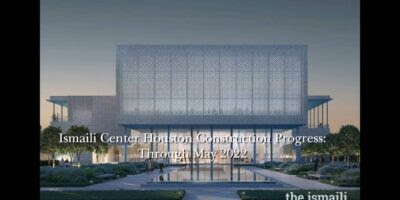ISMAILI CENTRE HOUSTON
ISMAILI CENTRE HOUSTON
Aga Khan plans still on
Plans are still in the works to build a Muslim Ismaili center at the corner of Allen Parkway and Montrose, according to the group that bought the property in 2006 and tore down the art deco warehouse that had sat on it for decades.
The Aga Khan Foundation purchased the 11-acre property with plans to build a facility to house conferences and lectures relating to the Aga Khan Development Network as well as for recitals and exhibitions to educate the public about Islam's heritage.
The building was also expected to contain a prayer hall, classrooms and offices, the group said when it bought the property.
The design concept and timeline for development weren't known when the property was purchased, however, and they still aren't.
“At the moment, no concrete plans have been developed,” said Zahir Janmohamed, CEO of the Aga Khan Council for the USA.
For now, the site is being used as a construction staging area for work being done on a nearby bridge.
Nothing is likely to happen there until a similar Ismaili center, which should break ground this year, is completed in Toronto.
And then Houston will be one of three new centers that could be developed next. The other two are in Los Angeles and Paris.
The Aga Khan will make the decision.
“We stand a good one-third chance to be the next,” Janmohamed said.
http://www.chron.com/disp/story.mpl/bus ... 73867.html
Plans are still in the works to build a Muslim Ismaili center at the corner of Allen Parkway and Montrose, according to the group that bought the property in 2006 and tore down the art deco warehouse that had sat on it for decades.
The Aga Khan Foundation purchased the 11-acre property with plans to build a facility to house conferences and lectures relating to the Aga Khan Development Network as well as for recitals and exhibitions to educate the public about Islam's heritage.
The building was also expected to contain a prayer hall, classrooms and offices, the group said when it bought the property.
The design concept and timeline for development weren't known when the property was purchased, however, and they still aren't.
“At the moment, no concrete plans have been developed,” said Zahir Janmohamed, CEO of the Aga Khan Council for the USA.
For now, the site is being used as a construction staging area for work being done on a nearby bridge.
Nothing is likely to happen there until a similar Ismaili center, which should break ground this year, is completed in Toronto.
And then Houston will be one of three new centers that could be developed next. The other two are in Los Angeles and Paris.
The Aga Khan will make the decision.
“We stand a good one-third chance to be the next,” Janmohamed said.
http://www.chron.com/disp/story.mpl/bus ... 73867.html
Let’s Show The World How Houston Does It (Again)
Posted in Houston, big questions, things there should be by nonsequiteuse on September 15, 2010
Recall the news from late 2006: The Aga Khan Foundation purchased land on the southeast corner of Allen Parkway at Montrose. According to HCAD, they still own the property, and while I’m sure their plans have been delayed for the same reason so many other large-scale construction projects have been in the past few years, I have not heard anything that leads me to believe the plans have changed.
Plans for the building of an Ismaili community center. Plans made and financed by an imam (the Aga Khan) who is the spiritual leader of an enormous Shia Muslim community.
Perhaps you’ve read a news story or 100 lately about how plans for a community center centered on the Muslim faith can stir emotions? And not, maybe, the nicest, noblest emotions? Perhaps you recall how some in the exurbs of Houston reacted a few years back to a smaller-scale but similar project? (Google “pig races Katy Islamic Association” if you’ve forgotten.)
Let me be very clear about several things:
1. Calling the Park51 development the “Ground Zero Mosque” is about as cricket as calling high fructose corn syrup corn sugar.
2. I still cling to the indoctrination I received during Saturday morning cartoons about what makes our country great. (This.)
3. I find nothing funny about peace, love, or understanding. (Reading the rest of this blog entry will be better with this video playing in the background. Try it.)
4. The Ismaili center has as much right to be here as any other organization.
5. Having a beautiful new building on this corner with space for cultural events, educational lectures, and religious gatherings will give Houston more feathers in our architectural and cultural caps.
6. Yes, anything built on this lot will generate more traffic at an already-horrible intersection. Maybe the Aga Khan Foundation could bump up the budget by a couple of hundred thousand to provide some fencing and off-street parking for the illegal dog park on the northwest corner of this intersection to mitigate the situation. Don’t dog parks make all development better?
Bottom line—how can Houston get ahead of the haters on this project? How can we plan to welcome this new cultural institution and head off any attempts to turn the development of the property into a media feeding frenzy focused on alarmingly-mustachoied hatemongers.
We need a coalition of the business, religious, cultural leaders, and concerned, connected citizens of our town to start planning now so that we can demonstrate to the world (once again) that Houston welcomes all comers, invites cross-cultural communication and collaboration, and thrives because of our diversity.
http://nonsequiteuse.wordpress.com/2010 ... -it-again/
Posted in Houston, big questions, things there should be by nonsequiteuse on September 15, 2010
Recall the news from late 2006: The Aga Khan Foundation purchased land on the southeast corner of Allen Parkway at Montrose. According to HCAD, they still own the property, and while I’m sure their plans have been delayed for the same reason so many other large-scale construction projects have been in the past few years, I have not heard anything that leads me to believe the plans have changed.
Plans for the building of an Ismaili community center. Plans made and financed by an imam (the Aga Khan) who is the spiritual leader of an enormous Shia Muslim community.
Perhaps you’ve read a news story or 100 lately about how plans for a community center centered on the Muslim faith can stir emotions? And not, maybe, the nicest, noblest emotions? Perhaps you recall how some in the exurbs of Houston reacted a few years back to a smaller-scale but similar project? (Google “pig races Katy Islamic Association” if you’ve forgotten.)
Let me be very clear about several things:
1. Calling the Park51 development the “Ground Zero Mosque” is about as cricket as calling high fructose corn syrup corn sugar.
2. I still cling to the indoctrination I received during Saturday morning cartoons about what makes our country great. (This.)
3. I find nothing funny about peace, love, or understanding. (Reading the rest of this blog entry will be better with this video playing in the background. Try it.)
4. The Ismaili center has as much right to be here as any other organization.
5. Having a beautiful new building on this corner with space for cultural events, educational lectures, and religious gatherings will give Houston more feathers in our architectural and cultural caps.
6. Yes, anything built on this lot will generate more traffic at an already-horrible intersection. Maybe the Aga Khan Foundation could bump up the budget by a couple of hundred thousand to provide some fencing and off-street parking for the illegal dog park on the northwest corner of this intersection to mitigate the situation. Don’t dog parks make all development better?
Bottom line—how can Houston get ahead of the haters on this project? How can we plan to welcome this new cultural institution and head off any attempts to turn the development of the property into a media feeding frenzy focused on alarmingly-mustachoied hatemongers.
We need a coalition of the business, religious, cultural leaders, and concerned, connected citizens of our town to start planning now so that we can demonstrate to the world (once again) that Houston welcomes all comers, invites cross-cultural communication and collaboration, and thrives because of our diversity.
http://nonsequiteuse.wordpress.com/2010 ... -it-again/
Landmark Tolerance sculptures close to the site of Ismaili Centre Houston.
Excerpt:
"During the dedication, Mayor Parker and former Houston Mayor Bill White publicly recognised Mawlana Hazar Imam’s partnership with the City of Houston in the Tolerance project, and his longstanding engagement with the city. Indeed, the vacant expanse along Allen Parkway across from the Tolerance sculptures is the site of a future high profile Ismaili Centre. There are five Ismaili Centres located in London, Vancouver, Lisbon, Dubai and Dushanbe, with another in Toronto under construction and Centres in Houston, Los Angeles and Paris in the planning stages.
“The Ismaili Centre will be an architectural statement and a place of peace, harmony, and welcome,” said Mayor Parker. “Thank you to the Aga Khan for a very significant gift towards the Tolerance project and for his commitment to Houston.”"
http://www.theismaili.org/cms/1192/Mawl ... -tolerance
Excerpt:
"During the dedication, Mayor Parker and former Houston Mayor Bill White publicly recognised Mawlana Hazar Imam’s partnership with the City of Houston in the Tolerance project, and his longstanding engagement with the city. Indeed, the vacant expanse along Allen Parkway across from the Tolerance sculptures is the site of a future high profile Ismaili Centre. There are five Ismaili Centres located in London, Vancouver, Lisbon, Dubai and Dushanbe, with another in Toronto under construction and Centres in Houston, Los Angeles and Paris in the planning stages.
“The Ismaili Centre will be an architectural statement and a place of peace, harmony, and welcome,” said Mayor Parker. “Thank you to the Aga Khan for a very significant gift towards the Tolerance project and for his commitment to Houston.”"
http://www.theismaili.org/cms/1192/Mawl ... -tolerance
Mawlana Hazar Imam to establish Ismaili Centre in Houston
Mawlana Hazar Imam confirmed plans to build a high-profile center in Houston on 22 March during his final Mulaqat of the USA Diamond Jubilee visit. He went on to say that the process of selecting architects is already underway with guidance from Hazar Imam’s brother Prince Amyn.
President of the Ismaili Council for the United States, Dr. Barkat Fazal, commented, “We are immensely grateful to Mawlana Hazar Imam as this Center, representing our ethics and values, will serve as an ambassadorial building furthering community connection and dialogue.”
Ismaili Centres represent the permanent presence and the core values of Ismaili communities around the world. These buildings, exceptional in architectural form, embody the hopeful aspirations of a forward-looking community. Through their libraries, classrooms, gardens, meeting spaces, and prayer halls, the buildings function as places of learning, contemplation, discovery, dialogue, and friendship. To learn more, visit the Ismaili Centres site.
During the same Mulaqat, on behalf of the USA Jamat, President Fazal presented a loyalty address to Mawlana Hazar Imam, and Vice-President Zahir Ladhani presented a gift to Hazar Imam of a collection of 147 glass weights dating back to the Fatimid era during the 10th and 11th centuries.
The weights illustrate the colorful variety, diversity, and artistic creativity of glass produced at the time of the Fatimid dynasty. Symbolically, they also represent aspects relating to pluralism, ethics, and equity, as well as religious and spiritual authority. The glass weights are inscribed with the names and titles of the Ismaili Imams of the period, as well as other phrases attesting to the Imam’s authority or wilaya. The inscriptions also emphasise the central role of the Imam and the concept of Imamah in Ismaili history and thought.
Addressing the Jamat gathered in Houston, Mawlana Hazar Imam expressed gratitude and happiness over his Diamond Jubilee visit to the United States, and conveyed guidance and blessings to the Jamat in the US and around the world.
Yesterday, on the occasion of Navroz, Hazar Imam was presented with the One Jamat Mosaic, comprising thousands of individual photos into a single, cohesive work of art. The mosaic was created by Ismaili artists to capture the excitement and anticipation of members of the USA Jamat during the Diamond Jubilee year, and in the lead up to Hazar Imam’s visit.
https://the.ismaili/diamond-jubilee/maw ... sh-houston
Mawlana Hazar Imam confirmed plans to build a high-profile center in Houston on 22 March during his final Mulaqat of the USA Diamond Jubilee visit. He went on to say that the process of selecting architects is already underway with guidance from Hazar Imam’s brother Prince Amyn.
President of the Ismaili Council for the United States, Dr. Barkat Fazal, commented, “We are immensely grateful to Mawlana Hazar Imam as this Center, representing our ethics and values, will serve as an ambassadorial building furthering community connection and dialogue.”
Ismaili Centres represent the permanent presence and the core values of Ismaili communities around the world. These buildings, exceptional in architectural form, embody the hopeful aspirations of a forward-looking community. Through their libraries, classrooms, gardens, meeting spaces, and prayer halls, the buildings function as places of learning, contemplation, discovery, dialogue, and friendship. To learn more, visit the Ismaili Centres site.
During the same Mulaqat, on behalf of the USA Jamat, President Fazal presented a loyalty address to Mawlana Hazar Imam, and Vice-President Zahir Ladhani presented a gift to Hazar Imam of a collection of 147 glass weights dating back to the Fatimid era during the 10th and 11th centuries.
The weights illustrate the colorful variety, diversity, and artistic creativity of glass produced at the time of the Fatimid dynasty. Symbolically, they also represent aspects relating to pluralism, ethics, and equity, as well as religious and spiritual authority. The glass weights are inscribed with the names and titles of the Ismaili Imams of the period, as well as other phrases attesting to the Imam’s authority or wilaya. The inscriptions also emphasise the central role of the Imam and the concept of Imamah in Ismaili history and thought.
Addressing the Jamat gathered in Houston, Mawlana Hazar Imam expressed gratitude and happiness over his Diamond Jubilee visit to the United States, and conveyed guidance and blessings to the Jamat in the US and around the world.
Yesterday, on the occasion of Navroz, Hazar Imam was presented with the One Jamat Mosaic, comprising thousands of individual photos into a single, cohesive work of art. The mosaic was created by Ismaili artists to capture the excitement and anticipation of members of the USA Jamat during the Diamond Jubilee year, and in the lead up to Hazar Imam’s visit.
https://the.ismaili/diamond-jubilee/maw ... sh-houston
Mayor: First Ismaili Center in the U.S. will be located in Houston
HOUSTON - Mayor Sylvester Turner is celebrating the announcement by the Aga Khan, the spiritual leader of Ismaili Muslims worldwide, that the first official Ismaili Center in the United States will be built in the heart of Houston.
Winding up a week-long visit to Houston, His Highness the Aga Khan confirmed that the Center will be located at the intersection of Allen Parkway and Montrose Boulevard just west of downtown. The planning process for selecting an architect has begun.
Hundreds of thousands of Ismaili Muslims live in the U.S. and Canada, with Houston having the largest population.
“The Aga Khan’s decision to locate the first center in Houston is a golden reflection of the city itself and of all Ismailis,” the mayor said. “Ismailis believe in pluralism, tolerance, openness, development, education and cultural engagement, making the Center a perfect fit for the most diverse city in the United States, where neighbors helping neighbors is one of our distinguishing traits and cultural engagement is an everyday part of our lives.”
Ismaili Centers are places of learning, contemplation, prayer, discovery, dialogue, and friendship, said the mayor, who visited a center in London during a trade mission last year.
“It was my privilege to welcome His Highness to Houston last weekend and to meet with him to discuss the work of the Aga Khan Development Network around the globe, as well as the contribution of the Ismaili Muslims to Greater Houston,” the mayor remarked.
The Houston Center “will be a representation of our ethics and values, and will serve as an ambassadorial building furthering community connection and dialogue,” said the president of the Ismaili Council for the United States, Dr. Barkat Fazal.
The Aga Khan departed Houston today after a trip celebrating his Diamond Jubilee, marking 60 years as the Ismaili Imam.
https://mailchi.mp/houstontx/mayor-appl ... a6c7b9493a
HOUSTON - Mayor Sylvester Turner is celebrating the announcement by the Aga Khan, the spiritual leader of Ismaili Muslims worldwide, that the first official Ismaili Center in the United States will be built in the heart of Houston.
Winding up a week-long visit to Houston, His Highness the Aga Khan confirmed that the Center will be located at the intersection of Allen Parkway and Montrose Boulevard just west of downtown. The planning process for selecting an architect has begun.
Hundreds of thousands of Ismaili Muslims live in the U.S. and Canada, with Houston having the largest population.
“The Aga Khan’s decision to locate the first center in Houston is a golden reflection of the city itself and of all Ismailis,” the mayor said. “Ismailis believe in pluralism, tolerance, openness, development, education and cultural engagement, making the Center a perfect fit for the most diverse city in the United States, where neighbors helping neighbors is one of our distinguishing traits and cultural engagement is an everyday part of our lives.”
Ismaili Centers are places of learning, contemplation, prayer, discovery, dialogue, and friendship, said the mayor, who visited a center in London during a trade mission last year.
“It was my privilege to welcome His Highness to Houston last weekend and to meet with him to discuss the work of the Aga Khan Development Network around the globe, as well as the contribution of the Ismaili Muslims to Greater Houston,” the mayor remarked.
The Houston Center “will be a representation of our ethics and values, and will serve as an ambassadorial building furthering community connection and dialogue,” said the president of the Ismaili Council for the United States, Dr. Barkat Fazal.
The Aga Khan departed Houston today after a trip celebrating his Diamond Jubilee, marking 60 years as the Ismaili Imam.
https://mailchi.mp/houstontx/mayor-appl ... a6c7b9493a
Houston Trade Mission to India Opened Doors to More Local Economic & Cultural Expansion
Excerpt:
Mayor Turner also visited sites in New Delhi with connections to future cultural amenities in Houston for residents and visitors alike. The mayor examined the Aga Khan Development Network’s restoration and expansion of buildings and grounds at Hamayun’s Tomb, a 16th century attraction that inspired the design of the Taj Mahal in Agra, India. The Aga Khan Foundation, led by the spiritual leader of Islam’s Ismaili movement worldwide, has announced plans to build a cultural center in central Houston.
More...
http://www.indoamerican-news.com/housto ... expansion/
Excerpt:
Mayor Turner also visited sites in New Delhi with connections to future cultural amenities in Houston for residents and visitors alike. The mayor examined the Aga Khan Development Network’s restoration and expansion of buildings and grounds at Hamayun’s Tomb, a 16th century attraction that inspired the design of the Taj Mahal in Agra, India. The Aga Khan Foundation, led by the spiritual leader of Islam’s Ismaili movement worldwide, has announced plans to build a cultural center in central Houston.
More...
http://www.indoamerican-news.com/housto ... expansion/
http://realtynewsreport.com/2019/02/08/ ... im-center/
Sunday , 10 February 2019
Site of Houston’s First Sears Store to become Major Ismaili Muslim Center
Eleven acres south of Buffalo Bayou will used for Ismaili Muslim Center.
HOUSTON – (Realty News Report) – An Ismaili Muslim center is being planned for a prime 11-acre tract – once the site of Houston’s first Sears store – just west of downtown Houston near Buffalo Bayou.
The Ismaili Center in Houston will serve the city’s approximately 40,000 Ismaili Muslims and is expected to include a Jamatkhana, or prayer hall, educational spaces, a social hall, and several multi-purpose meeting and conference spaces.
The site, which slopes down from West Dallas Street toward the bayou, is at the southeast corner of Allen Parkway and Montrose Boulevard.
The land was once the site of Houston’s first Sears store, opening in 1929. After flood waters from Buffalo Bayou inundated the store in 1935, Sears relocated to its South Main Street store in Midtown. The Allen Parkway property became a landmark art deco industrial property known as the Robinson Warehouse.
In 2006, the property was purchased by the Aga Khan Foundation. Then the Robinson Warehouse was demolished, clearing the way for Ismaili Center.
Although it will be several years before the center is complete, the architecture team was recently selected following a international design competition.
“We are excited to be working with architects of world stature and experience to design this unique project. It will embody both Houston’s and the Ismaili community’s pluralistic vision,” said Barkat Fazal, President of the Ismaili Council for the USA.
DLR Group/Westlake Reed Leskosky will collaborate with London-based design architect Farshid Moussavi on the project. Moussavi also works as an architecture professor at Harvard University. Landscape architect Nelson Byrd Woltz will work on the project, which will have courtyards and open spaces that could be impacted in times of extreme bayou flooding.
The new Ismaili Center will be the seventh in a series of iconic cultural buildings His Highness the Aga Khan has commissioned over the past four decades in the United Kingdom, Canada, Portugal, United Arab Emirates, and Tajikistan. Once complete, the center will serve as a national hub for the social, cultural, and intellectual activities of the Ismaili Muslim Community.
“We are very honored to partner with the Ismaili community to bring this historic building to life,” said DLR Group|WRL Senior Principal Paul Westlake, who leads the firm’s Cultural+Performing Arts Studio. “Houston is home to one of the largest Ismaili Muslim populations in North America, and the new center will serve as a place where community members can learn, pray, and engage in fellowship. Our team is privileged to have been chosen for a project that will have such a lasting impact on the local community and beyond.”
Feb. 8, 2019 Realty News Report Copyright 2019
Sunday , 10 February 2019
Site of Houston’s First Sears Store to become Major Ismaili Muslim Center
Eleven acres south of Buffalo Bayou will used for Ismaili Muslim Center.
HOUSTON – (Realty News Report) – An Ismaili Muslim center is being planned for a prime 11-acre tract – once the site of Houston’s first Sears store – just west of downtown Houston near Buffalo Bayou.
The Ismaili Center in Houston will serve the city’s approximately 40,000 Ismaili Muslims and is expected to include a Jamatkhana, or prayer hall, educational spaces, a social hall, and several multi-purpose meeting and conference spaces.
The site, which slopes down from West Dallas Street toward the bayou, is at the southeast corner of Allen Parkway and Montrose Boulevard.
The land was once the site of Houston’s first Sears store, opening in 1929. After flood waters from Buffalo Bayou inundated the store in 1935, Sears relocated to its South Main Street store in Midtown. The Allen Parkway property became a landmark art deco industrial property known as the Robinson Warehouse.
In 2006, the property was purchased by the Aga Khan Foundation. Then the Robinson Warehouse was demolished, clearing the way for Ismaili Center.
Although it will be several years before the center is complete, the architecture team was recently selected following a international design competition.
“We are excited to be working with architects of world stature and experience to design this unique project. It will embody both Houston’s and the Ismaili community’s pluralistic vision,” said Barkat Fazal, President of the Ismaili Council for the USA.
DLR Group/Westlake Reed Leskosky will collaborate with London-based design architect Farshid Moussavi on the project. Moussavi also works as an architecture professor at Harvard University. Landscape architect Nelson Byrd Woltz will work on the project, which will have courtyards and open spaces that could be impacted in times of extreme bayou flooding.
The new Ismaili Center will be the seventh in a series of iconic cultural buildings His Highness the Aga Khan has commissioned over the past four decades in the United Kingdom, Canada, Portugal, United Arab Emirates, and Tajikistan. Once complete, the center will serve as a national hub for the social, cultural, and intellectual activities of the Ismaili Muslim Community.
“We are very honored to partner with the Ismaili community to bring this historic building to life,” said DLR Group|WRL Senior Principal Paul Westlake, who leads the firm’s Cultural+Performing Arts Studio. “Houston is home to one of the largest Ismaili Muslim populations in North America, and the new center will serve as a place where community members can learn, pray, and engage in fellowship. Our team is privileged to have been chosen for a project that will have such a lasting impact on the local community and beyond.”
Feb. 8, 2019 Realty News Report Copyright 2019
https://www.dezeen.com/2019/02/12/ismai ... -moussavi/
Farshid Moussavi to design first Ismaili Center in the USA
Eleanor Gibson
Iranian-born British architect Farshid Moussavi has been selected ahead of Rem Koolhaas, Jeanne Gang and David Chipperfield to design an Ismaili cultural centre in Houston, Texas.
The London-based architect will work with Nelson Byrd Woltz Landscape Architects, Hanif Kara of structural engineering firm AKT II and Paul Westlake of design firm DLR Group to design the Ismaili Center for an 11-acre (4.5-hectare) site in downtown Houston.
Spearheaded by Aga Khan, the spiritual leader of the Ismaili Muslims, the centre will be the first dedicated to the Shia Ismaili Muslim community in the United States, and the seventh worldwide, following outposts in London, Lisbon, Dubai, Toronto, British Columbia and Dushanbe, capital of Tajikistan.
Farshid Moussavi "honoured" to design Ismaili Center Houston
Moussavi said she was honoured to work on the project: "It will bring Houston's diverse communities together in a unique space for cultural, educational and social activities."
"Our team brings a broad perspective for the Ismaili Center, with diverse skills and experience in international practice, scholarly research, multidisciplinary thinking and delivering cultural projects successfully in the United States," she added.
Ismaili Centre by Charles Correa
The Houston site will be the second in North America, following the Toronto hub, which was completed in 2015
Moussavi's proposal, for a plot that runs along the city's waterway, was selected as the winner of a competition on 5 February 2019, ahead of Koolhaas, Gang and Chipperfield.
"The evaluation and selection of these architects was both intense and enlightening," said the president of the Ismaili Council for the USA, Barkat Fazal.
"The interest from many world-renowned architects for the opportunity to design an Ismaili Center was a reminder of the global stature that an Ismaili Center, and indeed any project by the Ismaili Imamat, holds in the architectural and built environment community."
Cultural centre to "elevate city's architectural landscape"
Few details have been revealed about Moussavi's design but it will likely to follow the principles of the community's buildings, which aim to protect the core values of the Ismaili Muslim community. Each centre is intended to merge the principles of Islamic design with the surrounding city to make them architecturally unique.
Moussavi's design will be accompanied by gardens designed by Nelson Byrd Woltz, which also worked on Houston's Memorial Park, and the nearby Tolerance Sculptures, a monument built to celebrate diversity in the city.
Related story
Fumihiko Maki unveils Aga Khan Centre in London's King's Cross
"Ismaili Centers are symbolic markers of the permanent presence and core values of the Ismaili community around the world," said the Ismaili Community.
"[The Center in Houston] will enrich Houston's diverse community and elevate the city's architectural landscape."
The Ismaili Center Houston marks a major development for the Ismaili community, or USA Jamat, whose origins in the states date back to 1960s. Today, there are communities in 25, with "a large presence in Texas".
Ismaili Center Houston will be second outpost in North America
While the first in the US, The Houston site will be the second in North America, following the Toronto hub, completed in 2015 by Indian firm Charles Correa Associates and local studio Moriyama & Teshima Architects.
The project shares a patch of parkland with Fumihiko Maki's Aga Khan Museum, which showcases a collection of art and artefacts that charts a history of Muslim civilisations over the last 1,000 years.
Moussavi developed acclaim in the architecturally industry as the co-founder of the now-defunct Foreign Office Architects – the studio she founded in 1993 with her ex-husband Alejandro Zaera-Polo. She established her eponymous office in 2011, and has completed projects including the Museum of Contemporary Art Cleveland and Victoria Beckham's London boutique.
Farshid Moussavi to design first Ismaili Center in the USA
Eleanor Gibson
Iranian-born British architect Farshid Moussavi has been selected ahead of Rem Koolhaas, Jeanne Gang and David Chipperfield to design an Ismaili cultural centre in Houston, Texas.
The London-based architect will work with Nelson Byrd Woltz Landscape Architects, Hanif Kara of structural engineering firm AKT II and Paul Westlake of design firm DLR Group to design the Ismaili Center for an 11-acre (4.5-hectare) site in downtown Houston.
Spearheaded by Aga Khan, the spiritual leader of the Ismaili Muslims, the centre will be the first dedicated to the Shia Ismaili Muslim community in the United States, and the seventh worldwide, following outposts in London, Lisbon, Dubai, Toronto, British Columbia and Dushanbe, capital of Tajikistan.
Farshid Moussavi "honoured" to design Ismaili Center Houston
Moussavi said she was honoured to work on the project: "It will bring Houston's diverse communities together in a unique space for cultural, educational and social activities."
"Our team brings a broad perspective for the Ismaili Center, with diverse skills and experience in international practice, scholarly research, multidisciplinary thinking and delivering cultural projects successfully in the United States," she added.
Ismaili Centre by Charles Correa
The Houston site will be the second in North America, following the Toronto hub, which was completed in 2015
Moussavi's proposal, for a plot that runs along the city's waterway, was selected as the winner of a competition on 5 February 2019, ahead of Koolhaas, Gang and Chipperfield.
"The evaluation and selection of these architects was both intense and enlightening," said the president of the Ismaili Council for the USA, Barkat Fazal.
"The interest from many world-renowned architects for the opportunity to design an Ismaili Center was a reminder of the global stature that an Ismaili Center, and indeed any project by the Ismaili Imamat, holds in the architectural and built environment community."
Cultural centre to "elevate city's architectural landscape"
Few details have been revealed about Moussavi's design but it will likely to follow the principles of the community's buildings, which aim to protect the core values of the Ismaili Muslim community. Each centre is intended to merge the principles of Islamic design with the surrounding city to make them architecturally unique.
Moussavi's design will be accompanied by gardens designed by Nelson Byrd Woltz, which also worked on Houston's Memorial Park, and the nearby Tolerance Sculptures, a monument built to celebrate diversity in the city.
Related story
Fumihiko Maki unveils Aga Khan Centre in London's King's Cross
"Ismaili Centers are symbolic markers of the permanent presence and core values of the Ismaili community around the world," said the Ismaili Community.
"[The Center in Houston] will enrich Houston's diverse community and elevate the city's architectural landscape."
The Ismaili Center Houston marks a major development for the Ismaili community, or USA Jamat, whose origins in the states date back to 1960s. Today, there are communities in 25, with "a large presence in Texas".
Ismaili Center Houston will be second outpost in North America
While the first in the US, The Houston site will be the second in North America, following the Toronto hub, completed in 2015 by Indian firm Charles Correa Associates and local studio Moriyama & Teshima Architects.
The project shares a patch of parkland with Fumihiko Maki's Aga Khan Museum, which showcases a collection of art and artefacts that charts a history of Muslim civilisations over the last 1,000 years.
Moussavi developed acclaim in the architecturally industry as the co-founder of the now-defunct Foreign Office Architects – the studio she founded in 1993 with her ex-husband Alejandro Zaera-Polo. She established her eponymous office in 2011, and has completed projects including the Museum of Contemporary Art Cleveland and Victoria Beckham's London boutique.
World-renowned architects to design the Ismaili Center Houston
The Ismaili Center Houston will be located on an 11-acre site along the city’s main waterway, the Buffalo Bayou.
UK-based architect Farshid Moussavi has been selected to lead the design of the Ismaili Center, Houston — the first Ismaili Center in the USA.
The Center’s design team also includes Thomas L. Woltz, of Nelson Byrd Woltz Landscape Architects; Hanif Kara, co-founder of structural engineering firm AKT II and professor in practice, Harvard Graduate School of Design; and Paul Westlake of DLR Group, who leads the firm’s Global Cultural+Performing Arts Studio, as the architect of record.
The selection of architects follows the announcement made by Mawlana Hazar Imam during his Diamond Jubilee visit to the USA in March 2018 to build a high-profile Center in Houston.
The Jamat across the United States expressed gratitude and excitement at the possibilities and aspirations that an Ismaili Center represents for the USA and global Jamat. Ismaili Centers are symbolic markers of the permanent presence and core values of the Ismaili community around the world. The Center in Houston will be the first in the United States, and seventh globally. It will enrich Houston’s diverse community and elevate the city’s architectural landscape.
Houston’s Mayor Sylvester Turner welcomed the announcement. “The Ismaili Center will be a place where Houstonians of all backgrounds, faiths, and walks of life will find engaging, thoughtful, and compassionate programs, and people. That will be in keeping with Ismaili values and the values of the Ismaili leader, the Aga Khan, who last visited Houston in March 2018. It’s fitting that the Center will be designed by a world-renowned architect who has lived, studied and worked around the world, and that the green space will be designed by a landscape architect who has already worked on a major Houston park,” he said. “This is a milestone for our city.”
Ms Moussavi’s previous projects include the acclaimed Museum of Contemporary Art in Cleveland, USA; a three-story flagship store for Victoria Beckham in London, UK; the Yokohama International Cruise Terminal in Japan; London’s Ravensbourne College of Media and Communication; and the Torrevieja Auditorium and Madrid Carabanchel Social Housing Development, in Spain. Moussavi also served as chair of the Aga Khan Award for Architecture Master Jury in 2004 and was a member of the Award’s Steering Committee from 2005-2015.
“The evaluation and selection of these architects was both intense and enlightening. The interest from many world-renowned architects for the opportunity to design an Ismaili Center was a reminder of the global stature that an Ismaili Center, and indeed any project by the Ismaili Imamat, holds in the architectural and built environment community,” remarked Dr. Barkat Fazal, President of the Ismaili Council for the USA.
Moussavi is a graduate of the Harvard Graduate School of Design, where she is now a professor, and has previously taught at Columbia University, Princeton University, and the University of California in Los Angeles.
Commenting on the appointment, Farshid Moussavi stated, “Our team brings a broad perspective for the Ismaili Center, with diverse skills and experience in international practice, scholarly research, multidisciplinary thinking and delivering cultural projects successfully in the United States. I am honored to partner with the Ismaili Muslim community to design the new Ismaili Center in Houston. It will bring Houston’s diverse communities together in a unique space for cultural, educational and social activities.”
Houston is among the most ethnically diverse metropolitan areas in the United States and ranks first in total park acreage among major US cities. Green spaces and the external environment have comprised key elements of Ismaili Centers globally. Renowned landscape architect Thomas L. Woltz, who will design the green space surrounding the new Center, was named the Design Innovator of the Year by the Wall Street Journal Magazine in 2013. His works include the design of Hudson Yards in New York, Memorial Park in Houston, and the Aga Khan Garden in Edmonton, Canada.
Each Ismaili Center serves as an ambassadorial building, reflecting traditional principles of Islamic design, while incorporating contemporary elements from the society in which it is situated. The selected site in Houston will become the seventh such building — the other six are located in London, Vancouver, Lisbon, Dubai, Dushanbe, and Toronto.
As expressed by Mawlana Hazar Imam at the opening of the Ismaili Jamatkhana and Center in the Houston suburb of Sugar Land in 2002, “Since all that we see and do resonates on the faith, the aesthetics of the environments we build and the quality of the interactions that take place within them reverberate on our spiritual lives.” Hazar Imam went on to say “As the leader of a Muslim community, and particularly one that now resides in twenty-five countries on four continents, the physical representation of Islamic values is particularly important to me. It should reflect who we are in terms of our beliefs, our cultural heritage and our relation to the needs and contexts in which we live in today’s world.”
The Ismaili community in the United States began with students arriving in the 1960s and is established today in almost every state, with a large presence in Texas. For a number of years, the USA Jamat has organized educational and cultural events in collaboration with local and state governments, universities, museums, and faith organizations, to develop greater understanding between communities.
Reflecting their centuries-old tradition of service, members of the Jamat, young and old, have worked with cities, schools, and civil society organizations to assist those in need, including during Hurricane Harvey in August 2017, when over 2,500 volunteers quickly gathered to help their affected friends and neighbors in the greater Houston area.
Set against the backdrop of the iconic Tolerance Statues, which were made possible in part through a gift from Mawlana Hazar Imam to the city of Houston, and along the city’s main waterway, the Buffalo Bayou, the 11-acre site serves as an ideal location for the first Ismaili Center in the USA, one that will make a significant contribution to the city of Houston, the state of Texas, and the wider United States.
Photo of the site at:
https://the.ismaili/news/world-renowned ... er-houston
The Ismaili Center Houston will be located on an 11-acre site along the city’s main waterway, the Buffalo Bayou.
UK-based architect Farshid Moussavi has been selected to lead the design of the Ismaili Center, Houston — the first Ismaili Center in the USA.
The Center’s design team also includes Thomas L. Woltz, of Nelson Byrd Woltz Landscape Architects; Hanif Kara, co-founder of structural engineering firm AKT II and professor in practice, Harvard Graduate School of Design; and Paul Westlake of DLR Group, who leads the firm’s Global Cultural+Performing Arts Studio, as the architect of record.
The selection of architects follows the announcement made by Mawlana Hazar Imam during his Diamond Jubilee visit to the USA in March 2018 to build a high-profile Center in Houston.
The Jamat across the United States expressed gratitude and excitement at the possibilities and aspirations that an Ismaili Center represents for the USA and global Jamat. Ismaili Centers are symbolic markers of the permanent presence and core values of the Ismaili community around the world. The Center in Houston will be the first in the United States, and seventh globally. It will enrich Houston’s diverse community and elevate the city’s architectural landscape.
Houston’s Mayor Sylvester Turner welcomed the announcement. “The Ismaili Center will be a place where Houstonians of all backgrounds, faiths, and walks of life will find engaging, thoughtful, and compassionate programs, and people. That will be in keeping with Ismaili values and the values of the Ismaili leader, the Aga Khan, who last visited Houston in March 2018. It’s fitting that the Center will be designed by a world-renowned architect who has lived, studied and worked around the world, and that the green space will be designed by a landscape architect who has already worked on a major Houston park,” he said. “This is a milestone for our city.”
Ms Moussavi’s previous projects include the acclaimed Museum of Contemporary Art in Cleveland, USA; a three-story flagship store for Victoria Beckham in London, UK; the Yokohama International Cruise Terminal in Japan; London’s Ravensbourne College of Media and Communication; and the Torrevieja Auditorium and Madrid Carabanchel Social Housing Development, in Spain. Moussavi also served as chair of the Aga Khan Award for Architecture Master Jury in 2004 and was a member of the Award’s Steering Committee from 2005-2015.
“The evaluation and selection of these architects was both intense and enlightening. The interest from many world-renowned architects for the opportunity to design an Ismaili Center was a reminder of the global stature that an Ismaili Center, and indeed any project by the Ismaili Imamat, holds in the architectural and built environment community,” remarked Dr. Barkat Fazal, President of the Ismaili Council for the USA.
Moussavi is a graduate of the Harvard Graduate School of Design, where she is now a professor, and has previously taught at Columbia University, Princeton University, and the University of California in Los Angeles.
Commenting on the appointment, Farshid Moussavi stated, “Our team brings a broad perspective for the Ismaili Center, with diverse skills and experience in international practice, scholarly research, multidisciplinary thinking and delivering cultural projects successfully in the United States. I am honored to partner with the Ismaili Muslim community to design the new Ismaili Center in Houston. It will bring Houston’s diverse communities together in a unique space for cultural, educational and social activities.”
Houston is among the most ethnically diverse metropolitan areas in the United States and ranks first in total park acreage among major US cities. Green spaces and the external environment have comprised key elements of Ismaili Centers globally. Renowned landscape architect Thomas L. Woltz, who will design the green space surrounding the new Center, was named the Design Innovator of the Year by the Wall Street Journal Magazine in 2013. His works include the design of Hudson Yards in New York, Memorial Park in Houston, and the Aga Khan Garden in Edmonton, Canada.
Each Ismaili Center serves as an ambassadorial building, reflecting traditional principles of Islamic design, while incorporating contemporary elements from the society in which it is situated. The selected site in Houston will become the seventh such building — the other six are located in London, Vancouver, Lisbon, Dubai, Dushanbe, and Toronto.
As expressed by Mawlana Hazar Imam at the opening of the Ismaili Jamatkhana and Center in the Houston suburb of Sugar Land in 2002, “Since all that we see and do resonates on the faith, the aesthetics of the environments we build and the quality of the interactions that take place within them reverberate on our spiritual lives.” Hazar Imam went on to say “As the leader of a Muslim community, and particularly one that now resides in twenty-five countries on four continents, the physical representation of Islamic values is particularly important to me. It should reflect who we are in terms of our beliefs, our cultural heritage and our relation to the needs and contexts in which we live in today’s world.”
The Ismaili community in the United States began with students arriving in the 1960s and is established today in almost every state, with a large presence in Texas. For a number of years, the USA Jamat has organized educational and cultural events in collaboration with local and state governments, universities, museums, and faith organizations, to develop greater understanding between communities.
Reflecting their centuries-old tradition of service, members of the Jamat, young and old, have worked with cities, schools, and civil society organizations to assist those in need, including during Hurricane Harvey in August 2017, when over 2,500 volunteers quickly gathered to help their affected friends and neighbors in the greater Houston area.
Set against the backdrop of the iconic Tolerance Statues, which were made possible in part through a gift from Mawlana Hazar Imam to the city of Houston, and along the city’s main waterway, the Buffalo Bayou, the 11-acre site serves as an ideal location for the first Ismaili Center in the USA, one that will make a significant contribution to the city of Houston, the state of Texas, and the wider United States.
Photo of the site at:
https://the.ismaili/news/world-renowned ... er-houston
https://www.forbes.com/sites/cynthiales ... 6a9fc65a7e
Apr 2, 2019, 02:33pm
Project To Build Ismaili Center Houston, First in U.S., Gains Its Design Team
Cynthia Lescalleet, Contributor, Real Estate - I profile intriguing real estate projects in and around Houston.
A prime, vacant parcel near Houston's Buffalo Bayou and sited just west of downtown is slated for the first Ismaili Center in the U.S., joining a series of six other such facilities operating around the world.
The 11-acre Houston tract, currently appraised at $30.3 million, was purchased in 2006 by the Aga Khan Foundation as the future site for the center. As mandated, its role is to be a place of peace, prayer, hope, humility and brotherhood, a project update says.
Long-planned, the Houston project recently entered the design phase following an international competition that netted London-based architect Farshid Moussavi in collaboration with Paul Westlake of DLR Group as architect of record and landscape architect Thomas L. Woltz of Nelson Byrd Woltz. NBW is also working on redevelopment of Houston's Memorial Park and Rothko Chapel campus.
Built over the past four decades, previously completed Ismaili centers are located in London, Vancouver, Toronto, Lisbon, Dubai and Dushanbe.
In Houston, plans for the campus include spaces for social and cultural gatherings, intellectual engagement and reflection, and spiritual contemplation for the diverse Ismaili community — as well as the city's multi-cultural one, thus "fostering an appreciation of pluralism," the design team announcement says.
Although few project details have been released, the center in Houston is expected to include a Jamatkhana, which is a place for worship, with additional spaces to accommodate the center's "ambassadorial" roles, meaning outreach, knowledge and fellowship between people of all faiths and walks of life.
A construction start has not been determined for the project, notes Omar Samji, a volunteer with the Ismaili Council in Houston.
The site slopes toward Buffalo Bayou, which has come out of its banks many times over the years, most recently during Hurricane Harvey.
While flooding from that 2017 storm did affect lower-elevations of the center's site, Samji says, it did not delay the project. Rather it provided useful data for planning flood management and mitigation and landscaping.
Apr 2, 2019, 02:33pm
Project To Build Ismaili Center Houston, First in U.S., Gains Its Design Team
Cynthia Lescalleet, Contributor, Real Estate - I profile intriguing real estate projects in and around Houston.
A prime, vacant parcel near Houston's Buffalo Bayou and sited just west of downtown is slated for the first Ismaili Center in the U.S., joining a series of six other such facilities operating around the world.
The 11-acre Houston tract, currently appraised at $30.3 million, was purchased in 2006 by the Aga Khan Foundation as the future site for the center. As mandated, its role is to be a place of peace, prayer, hope, humility and brotherhood, a project update says.
Long-planned, the Houston project recently entered the design phase following an international competition that netted London-based architect Farshid Moussavi in collaboration with Paul Westlake of DLR Group as architect of record and landscape architect Thomas L. Woltz of Nelson Byrd Woltz. NBW is also working on redevelopment of Houston's Memorial Park and Rothko Chapel campus.
Built over the past four decades, previously completed Ismaili centers are located in London, Vancouver, Toronto, Lisbon, Dubai and Dushanbe.
In Houston, plans for the campus include spaces for social and cultural gatherings, intellectual engagement and reflection, and spiritual contemplation for the diverse Ismaili community — as well as the city's multi-cultural one, thus "fostering an appreciation of pluralism," the design team announcement says.
Although few project details have been released, the center in Houston is expected to include a Jamatkhana, which is a place for worship, with additional spaces to accommodate the center's "ambassadorial" roles, meaning outreach, knowledge and fellowship between people of all faiths and walks of life.
A construction start has not been determined for the project, notes Omar Samji, a volunteer with the Ismaili Council in Houston.
The site slopes toward Buffalo Bayou, which has come out of its banks many times over the years, most recently during Hurricane Harvey.
While flooding from that 2017 storm did affect lower-elevations of the center's site, Samji says, it did not delay the project. Rather it provided useful data for planning flood management and mitigation and landscaping.
https://the.ismaili/news/mawlana-hazar- ... uston-site
Mawlana Hazar Imam toured the site of the Ismaili Center Houston yesterday, 22 November, alongside the Center’s design team and the leadership of the USA Jamat. During his trip, Mawlana Hazar Imam also met with City of Houston Mayor the Honorable Sylvester Turner.
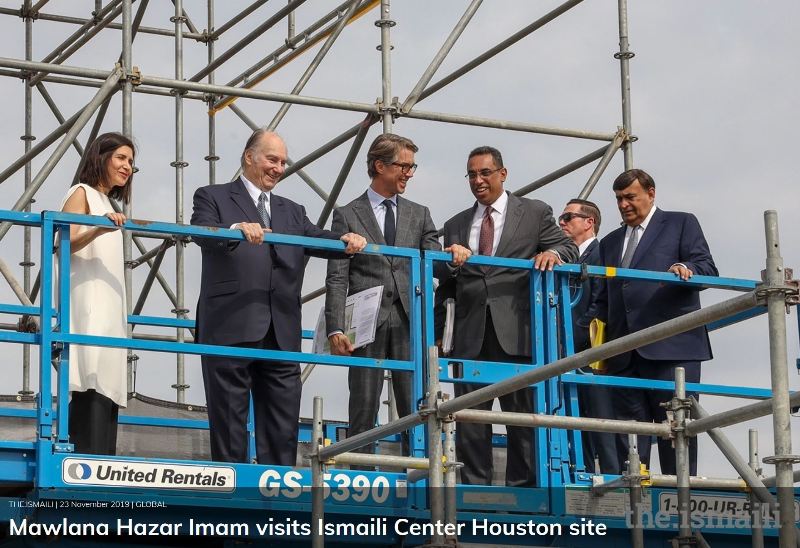
The Ismaili Center Houston will be the seventh Center, joining others in London, Vancouver, Lisbon, Dubai, Dushanbe, and Toronto. Ismaili Centers serve to reflect, illustrate and represent the Ismaili community’s intellectual and spiritual understanding of Islam, its social conscience, its organization, its discipline, its forward outlook, and its positive attitude towards the societies in which it lives. They are symbolic markers of the permanent presence of the Ismaili community, and are a symbol of the confluence between the spiritual and the secular in Islam.
During Mawlana Hazar Imam’s Diamond Jubilee visit to the United States in March 2018, he graciously confirmed his intent to build the Ismaili Center Houston. In February of this year, another milestone announcement was made confirming Farshid Moussavi as the building architect and Thomas Woltz as the landscape architect, both of whom joined Hazar Imam for the site tour this week.
Earlier this year, Mayor Turner said, “The Ismaili Center will be a place where Houstonians of all backgrounds, faiths, and walks of life will find engaging, thoughtful, and compassionate programs, and people. That will be in keeping with Ismaili values and the values of the Ismaili leader, the Aga Khan, who last visited Houston in March 2018. It’s fitting that the Center will be designed by a world-renowned architect who has lived, studied and worked around the world, and that the green space will be designed by a landscape architect who has already worked on a major Houston park.”
President of the Ismaili Council for the United States, Al-Karim Alidina, said, “We are most grateful for Hazar Imam’s visit to progress this milestone project. We hope that the Ismaili Center Houston will be a marker of the permanency of the US Jamat, a bridge to civil society and a symbol of hope and pluralism.”
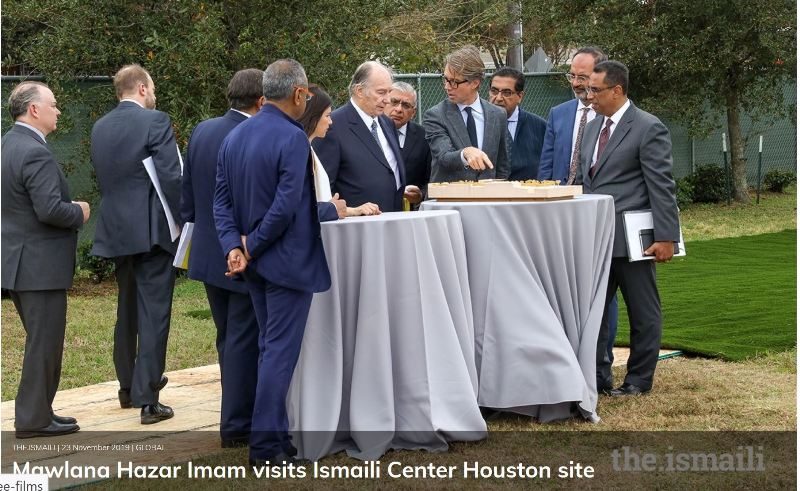

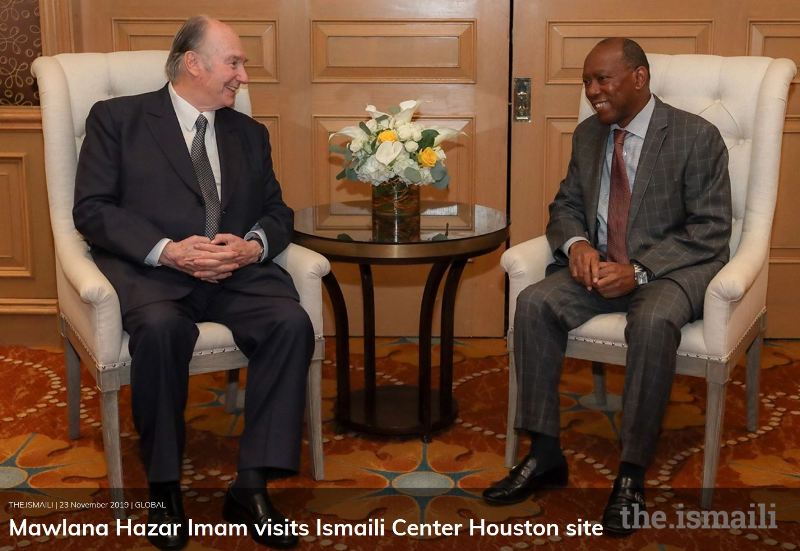

Mawlana Hazar Imam toured the site of the Ismaili Center Houston yesterday, 22 November, alongside the Center’s design team and the leadership of the USA Jamat. During his trip, Mawlana Hazar Imam also met with City of Houston Mayor the Honorable Sylvester Turner.

The Ismaili Center Houston will be the seventh Center, joining others in London, Vancouver, Lisbon, Dubai, Dushanbe, and Toronto. Ismaili Centers serve to reflect, illustrate and represent the Ismaili community’s intellectual and spiritual understanding of Islam, its social conscience, its organization, its discipline, its forward outlook, and its positive attitude towards the societies in which it lives. They are symbolic markers of the permanent presence of the Ismaili community, and are a symbol of the confluence between the spiritual and the secular in Islam.
During Mawlana Hazar Imam’s Diamond Jubilee visit to the United States in March 2018, he graciously confirmed his intent to build the Ismaili Center Houston. In February of this year, another milestone announcement was made confirming Farshid Moussavi as the building architect and Thomas Woltz as the landscape architect, both of whom joined Hazar Imam for the site tour this week.
Earlier this year, Mayor Turner said, “The Ismaili Center will be a place where Houstonians of all backgrounds, faiths, and walks of life will find engaging, thoughtful, and compassionate programs, and people. That will be in keeping with Ismaili values and the values of the Ismaili leader, the Aga Khan, who last visited Houston in March 2018. It’s fitting that the Center will be designed by a world-renowned architect who has lived, studied and worked around the world, and that the green space will be designed by a landscape architect who has already worked on a major Houston park.”
President of the Ismaili Council for the United States, Al-Karim Alidina, said, “We are most grateful for Hazar Imam’s visit to progress this milestone project. We hope that the Ismaili Center Houston will be a marker of the permanency of the US Jamat, a bridge to civil society and a symbol of hope and pluralism.”




Ismaili Center Houston Project Update from the Jamati Institutions
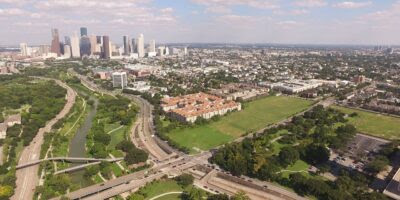
As you may recall, on March 22, 2018, during his Diamond Jubilee visit to the United States, Mawlana Hazar Imam gave permission to start planning to build the seventh Ismaili Center in the world to be located in Houston, Texas.
We are deeply grateful to Mawlana Hazar Imam for his oversight of this project and for visiting Houston in November 2019 to provide his continuing guidance as the plans and design for the Center have been developed.
The project and design teams have been working diligently to refine the design of the Center based on continual input from the Oversight Committee, which is chaired by Mawlana Hazar Imam and includes Prince Amyn and Prince Rahim. We are delighted to share that Mawlana Hazar Imam has approved the start of construction; as such, we will now proceed with site work and excavation. Considering the current context and travel restrictions, the formal foundation ceremony to commemorate the start of the project will, inshallah, be organized in a few months.
As a next step, we are planning to hold a design sharing event in Houston in mid-November to share preliminary images of the Center and discuss how it will be used to serve the Jamat and the broader community in the Houston area and beyond. We will share these preview images in the near future.
We thank you for your continued support, look forward to continuing to partner with you in realizing Mawlana Hazar Imam’s vision for the Ismaili Center Houston, and will keep you updated as the project progresses.
We remain deeply grateful for Mawlana Hazar Imam’s generosity of time as he continues to guide the development of the Ismaili Center Houston. This is an important milestone project for the US and global Jamat, as it marks our permanence in this country and speaks to the Imam’s confidence in and vision for the future of our community in the United States. We convey our heartfelt mubarakis to you all on this defining moment in our history. Let us collectively offer our humble shukrana to the Imam for the blessings bestowed upon us.
Al-Karim Alidina
President, Ismaili Council for USA
Murad Abdullah
Chairman, ITREB USA
https://the.ismaili/usa/ismaili-center- ... stitutions

As you may recall, on March 22, 2018, during his Diamond Jubilee visit to the United States, Mawlana Hazar Imam gave permission to start planning to build the seventh Ismaili Center in the world to be located in Houston, Texas.
We are deeply grateful to Mawlana Hazar Imam for his oversight of this project and for visiting Houston in November 2019 to provide his continuing guidance as the plans and design for the Center have been developed.
The project and design teams have been working diligently to refine the design of the Center based on continual input from the Oversight Committee, which is chaired by Mawlana Hazar Imam and includes Prince Amyn and Prince Rahim. We are delighted to share that Mawlana Hazar Imam has approved the start of construction; as such, we will now proceed with site work and excavation. Considering the current context and travel restrictions, the formal foundation ceremony to commemorate the start of the project will, inshallah, be organized in a few months.
As a next step, we are planning to hold a design sharing event in Houston in mid-November to share preliminary images of the Center and discuss how it will be used to serve the Jamat and the broader community in the Houston area and beyond. We will share these preview images in the near future.
We thank you for your continued support, look forward to continuing to partner with you in realizing Mawlana Hazar Imam’s vision for the Ismaili Center Houston, and will keep you updated as the project progresses.
We remain deeply grateful for Mawlana Hazar Imam’s generosity of time as he continues to guide the development of the Ismaili Center Houston. This is an important milestone project for the US and global Jamat, as it marks our permanence in this country and speaks to the Imam’s confidence in and vision for the future of our community in the United States. We convey our heartfelt mubarakis to you all on this defining moment in our history. Let us collectively offer our humble shukrana to the Imam for the blessings bestowed upon us.
Al-Karim Alidina
President, Ismaili Council for USA
Murad Abdullah
Chairman, ITREB USA
https://the.ismaili/usa/ismaili-center- ... stitutions

Ismaili Center Houston designed to embody a spirit of openness and dialogue
Established by Mawlana Hazar Imam for the Jamat in the USA and around the world, the new Ismaili Center will represent dialogue between faith and world, East and West, traditional and contemporary, and between humanity and nature.
After many years of anticipation, designs of the forthcoming Ismaili Center in Houston were presented today at a special event hosted in Texas and streamed live around the world. An esteemed design team shared plans for the site’s building and gardens with civic officials, community representatives, architects, leaders from civil society, and the media.
Al-Karim Alidina, President of the Ismaili Council for the United States, conveyed gratitude to Mawlana Hazar Imam for establishing the first Ismaili Center in the USA, and expressed his hopes for what the Center will mean for the Jamat, its neighbors, and the wider community.
“This center is designed,” he said, “with the purpose of serving as both a Jamatkhana for the Shia Ismaili Muslim community to come together for prayers, spiritual search, and contemplation; as well as an ambassadorial cultural center for the city and state, driving knowledge sharing and thought partnership.”
The new Center will express in physical form the Jamat’s commitment to building a pluralist society and finding ways to unite diverse people and cultures. “It will be a place of gathering for the Ismaili community, where people of all faiths will be welcome,” President Al-Karim added.
Joining a network of prestigious yet unique sister sites located in London (UK), Lisbon (Portugal), Dubai (UAE), Dushanbe (Tajikistan), Vancouver and Toronto (Canada); the Center in Houston — through its exceptional form and function — will acknowledge the Jamat’s 1,400 year history, while in parallel, embodying the hopeful aspirations of the Ismaili community.
Dialogue in different forms
Internationally acclaimed architect Farshid Moussavi, who was selected in 2019 as the lead architect of the Center, explained the broader context and the design team’s thought process behind the newly revealed plans.
“I have been fortunate to work in different capacities with His Highness for about 11 years – first through the Aga Khan Award,” she said. “I was part of the Jury, then I was for ten years part of the Steering Committee. At the time I didn’t really know that this was going to prepare me for this task,” Ms Moussavi continued.
“We have tried to work with Islamic design philosophy, and celebrate its singularity and unique qualities as well as the features it has in common with Western design, so that the building, both through its fabric and through the way it is used, would act as a symbol of dialogue.”
The Center’s design is contemporary, yet reflects a historically rooted, rich architectural heritage. It combines modern architectural technology with traditional Persian forms and ornament, including ceramic mosaics and mashrabiya screens.
The building interior will include three atriums acting as common, flexible spaces between rooms dedicated to specific events. Each is designed in such a way as to fill the heart of the building with natural light and views of the sky above.
“The Center will elevate, yet again, Houston on the world map as a global city where people of all backgrounds can come together,” reflected Mayor of Houston Sylvester Turner in his remarks.
“This notion of learning about and accepting differences amongst peoples and communities, what we call pluralism, is central to the Aga Khan’s vision for the survival of an increasingly interconnected world,” he continued. “The Ismaili Muslim community in Houston and the United States continues to actualise the values that these Centers aim to promote – friendship, service, and mutual understanding.”
Architect of record, Paul Westlake, described the building as a “tool for elevating the human spirit,” and “a symbol of the values and of the virtues of the Ismaili faith.” He added that this was “architecture as art,” drawing attention to the beautiful spaces, intricate geometry, authentic materials, and highly crafted work. “It is inspiring and contemplative, and quietly monumental,” a building that will be recognised internationally.
Open on all sides
A unique feature of the new Center is the inclusion of three eivans, or rectangular covered verandas, common in Persian buildings, supported by 49 slender columns – encouraging visitors to congregate in the building’s outdoor areas to enjoy views of the gardens and the city beyond.
In being open on all sides and visible from all approaches to the site, the eivans will make the Ismaili Center open and inviting in every direction. At night, they will transform it to a beacon of light along Houston’s Montrose Boulevard and Allen Parkway.
The structure contains exposed steel encased in concrete for sustainability and longevity, assuring a lifecycle of 100 years or more. Externally, the Center’s light-colored stone walls, described as a ‘tapestry in stone,’ contain alcoves and screens, allowing Houston’s heat to dissipate, while providing shade and ventilation.
From wherever one enters the site, visitors will be welcomed by garden spaces. The concept of a centrally-located building surrounded by gardens has been part of the architectural heritage of the Muslim world for many centuries.
“The relationship between building and nature is an important characteristic of Persian architecture, and generally in Islam,” observed Ms Moussavi. “We took that harmony between the two as one of the starting points in the project.”
The Center’s landscaped gardens will provide a sense of serenity and peace, offering a respite from its urban surroundings. They will include several live oak and peach tree-shaded areas, fountains, flowerbeds, lawns, walkways, and a large amphitheater in a sunken lawn. These will be spaces of solace, providing for the rejuvenation of the mind and the spirit.
The project’s landscape architect, Thomas Woltz, stated that the Center’s design is reminiscent of Islamic-inspired landscapes yet the horticulture is indigenous to Texas, allowing the Jamat to identify with its historic roots and traditions while relating to their local environment. He envisioned that it would be a “joyful landscape full of colour, year-round.”
“It is my sincere hope,” added Mr Woltz, “that this project brings greater understanding about the beauty and complexity of the history of the Muslim world.”
The building and its gardens will aim to build bridges through intellectual exchange by hosting concerts, recitals, plays, performances, exhibitions, conferences, seminars, conversations, book launches, and community gatherings.
“The Ismaili Center, Houston, is a beautiful and timeless gift to the Jamat and local neighborhood in Houston, and I am honoured to be part of the building project.” said Hanif Kara, a structural engineer and professor at Harvard Graduate School of Design.
“Its design reflects the values and aspirations of the Ismail community here and around the world. Responding to the needs of the time, the design team has conceived a solution that is productive, relevant, and resonates with the next generation.”
As the event concluded, the audience were left eagerly anticipating the start of construction and landscaping work of the newest Ismaili Center, which will in time become a welcome landmark in the country and in the lives of the Jamat in the United States.
“In the evenings, the building will glow like a lantern, inviting one inside,” Ms Moussavi articulated. “It will be a monument to openness and dialogue.”
Images at:
https://the.ismaili/global/news/institu ... d-dialogue
Houston Mayor Sylvester Turner's Remarks for the Design Preview of the Ismaili Center, Houston
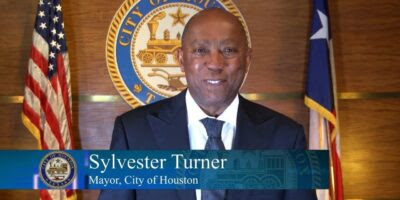
Video
https://www.youtube.com/watch?v=fo79JnslZuQ
On November 15, 2021, the Honorable Sylvester Turner, Mayor of the City of Houston, offered remarks on the occasion of the Design Preview of the Ismaili Center, Houston.

Video
https://www.youtube.com/watch?v=fo79JnslZuQ
On November 15, 2021, the Honorable Sylvester Turner, Mayor of the City of Houston, offered remarks on the occasion of the Design Preview of the Ismaili Center, Houston.
The Ismaili Center, Houston - Design Preview Event
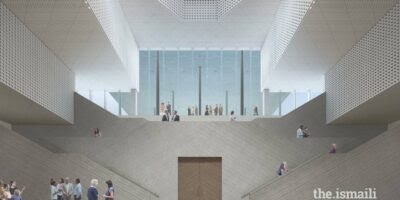
Video:
https://www.youtube.com/watch?v=WI2kGCxCV2s

Video:
https://www.youtube.com/watch?v=WI2kGCxCV2s
https://www.bisnow.com/houston/news/con ... 024-110961
First U.S. Ismaili Center Coming To Buffalo Bayou Area In 2024
Also in Houston Chronicle:
https://www.houstonchronicle.com/lifest ... 622519.php
Exclusive: America's first Ismaili Center will be architectural jewel for Houston
First U.S. Ismaili Center Coming To Buffalo Bayou Area In 2024
Also in Houston Chronicle:
https://www.houstonchronicle.com/lifest ... 622519.php
Exclusive: America's first Ismaili Center will be architectural jewel for Houston
Ismaili Center, Houston Design Preview: Remarks by Landscape Architect Thomas Woltz
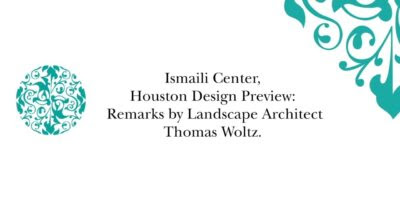
Video:
https://www.youtube.com/watch?v=SMVPcjKuZ6Q

Video:
https://www.youtube.com/watch?v=SMVPcjKuZ6Q
https://www.archpaper.com/2021/11/ismai ... hitecture/
The United States’ first Ismaili Center in Houston unveils its design by Farshid Moussavi Architecture
By Aaron Seward • November 18, 2021 • Architecture, Southwest, Unveiled
The Ismaili Center Houston has at long last released the first renderings of its new headquarters, designed by the London-based Farshid Moussavi Architecture with local firm DLR Group serving as the architect of record and gardens by Nelson Byrd Woltz Landscape Architecture. News that the team won the commission for the project first broke in 2019—they beat out such international heavyweights as OMA, Studio Gang, and David Chipperfield Architects—but details of the design have been carefully guarded until an announcement on November 14. Located on a 30-acre site overlooking Buffalo Bayou at the corner of Montrose Boulevard and Allen Parkway, the Center will further consolidate this corridor of the central city as an impressive processional artery of institutional monuments. Its near neighbors include a Michael Graves-designed Federal Reserve Bank and an in-construction headquarters for the Houston Endowment designed by Kevin Daly Architects and Productora.
His Highness the Aga Khan, the Imam of Ismailism, a branch of Shia Islam, selected Houston as the location for the United States’ first Ismaili Center, and the seventh in the world. Currently, there are similar centers, built between 1985 and 2014, located in London; Lisbon; Dubai; Dushanbe, Tajikistan; Burnaby, British Columbia, and Toronto. The Aga Khan is a well-known patron of architecture, and the progenitor of the eponymous Aga Khan Award for Architecture, which he founded in 1977. Houston got the nod as the location for the U.S.’s first such structure because of its large Ismaili population (Texas is home to some 50,000 members of the sect) and the city’s exceptional diversity. These centers are constructed as “ambassador buildings” between Ismailis and the communities in which they live and are meant to signal this branch of Shia Islam’s openness and tolerance.
The Houston Center is also one of the first major cultural institutions in the city to be designed by a woman-led practice. In a statement, Moussavi said that “We have tried to work with Islamic design philosophy and celebrate its singularity and unique qualities as well as the features it has in common with western design, so that the building, both through its fabric and through the way it is used, would act as a symbol of dialog.”
The building’s form is composed of three interlocking boxes, each supporting a second-floor verandah covered by flat roofs supported on tall, slender columns that Moussavi said are inspired by the ruins at Persepolis. The volumes will be clad in Turkish marble tiles arranged in patterns derived from Islamic architecture. Some areas are solid, others porous, while deep alcoves in the facades provide secluded places for contemplation or intimate conversation. Inside are three atriums, conceived as common flexible spaces that can be used in a variety of ways. The central atrium features a monumental stair surrounded by ceramic screens, which the architects say is a nod to the cupola, which was very important to ancient Persian and Byzantine Christian architecture. The east and west atriums give access to a theater, large hall, and learning rooms.
The surrounding gardens, designed by Nelson Byrd Woltz, which is also completing a redesign of nearby Memorial Park, while composed of native vegetation, was inspired by Islamic landscape design, which has multiple sources. As founder Thomas Woltz told the Houston Chronicle, “What other tradition of landscaping draws from Africa, Europe, the Middle East, Far East, and South Asia? There are Houstonians from all of those places, so it stands as a symbol of that pluralism that also reflects the city of Houston.”
The 10-acres of gardens will include a great lawn, hardscaped plazas, courtyards, and vegetative “rooms,” each featuring plants from different Texas regions: High Plains, trans-Pecos, Cross Timbers, Blackland Prairie, and Gulf Coast Prairie. Along Allen Parkway, closest to Buffalo Bayou, will be a bayou garden with flood resilient plants.
Excavation on the site has already begun and construction is scheduled to wrap up in 2024.
The United States’ first Ismaili Center in Houston unveils its design by Farshid Moussavi Architecture
By Aaron Seward • November 18, 2021 • Architecture, Southwest, Unveiled
The Ismaili Center Houston has at long last released the first renderings of its new headquarters, designed by the London-based Farshid Moussavi Architecture with local firm DLR Group serving as the architect of record and gardens by Nelson Byrd Woltz Landscape Architecture. News that the team won the commission for the project first broke in 2019—they beat out such international heavyweights as OMA, Studio Gang, and David Chipperfield Architects—but details of the design have been carefully guarded until an announcement on November 14. Located on a 30-acre site overlooking Buffalo Bayou at the corner of Montrose Boulevard and Allen Parkway, the Center will further consolidate this corridor of the central city as an impressive processional artery of institutional monuments. Its near neighbors include a Michael Graves-designed Federal Reserve Bank and an in-construction headquarters for the Houston Endowment designed by Kevin Daly Architects and Productora.
His Highness the Aga Khan, the Imam of Ismailism, a branch of Shia Islam, selected Houston as the location for the United States’ first Ismaili Center, and the seventh in the world. Currently, there are similar centers, built between 1985 and 2014, located in London; Lisbon; Dubai; Dushanbe, Tajikistan; Burnaby, British Columbia, and Toronto. The Aga Khan is a well-known patron of architecture, and the progenitor of the eponymous Aga Khan Award for Architecture, which he founded in 1977. Houston got the nod as the location for the U.S.’s first such structure because of its large Ismaili population (Texas is home to some 50,000 members of the sect) and the city’s exceptional diversity. These centers are constructed as “ambassador buildings” between Ismailis and the communities in which they live and are meant to signal this branch of Shia Islam’s openness and tolerance.
The Houston Center is also one of the first major cultural institutions in the city to be designed by a woman-led practice. In a statement, Moussavi said that “We have tried to work with Islamic design philosophy and celebrate its singularity and unique qualities as well as the features it has in common with western design, so that the building, both through its fabric and through the way it is used, would act as a symbol of dialog.”
The building’s form is composed of three interlocking boxes, each supporting a second-floor verandah covered by flat roofs supported on tall, slender columns that Moussavi said are inspired by the ruins at Persepolis. The volumes will be clad in Turkish marble tiles arranged in patterns derived from Islamic architecture. Some areas are solid, others porous, while deep alcoves in the facades provide secluded places for contemplation or intimate conversation. Inside are three atriums, conceived as common flexible spaces that can be used in a variety of ways. The central atrium features a monumental stair surrounded by ceramic screens, which the architects say is a nod to the cupola, which was very important to ancient Persian and Byzantine Christian architecture. The east and west atriums give access to a theater, large hall, and learning rooms.
The surrounding gardens, designed by Nelson Byrd Woltz, which is also completing a redesign of nearby Memorial Park, while composed of native vegetation, was inspired by Islamic landscape design, which has multiple sources. As founder Thomas Woltz told the Houston Chronicle, “What other tradition of landscaping draws from Africa, Europe, the Middle East, Far East, and South Asia? There are Houstonians from all of those places, so it stands as a symbol of that pluralism that also reflects the city of Houston.”
The 10-acres of gardens will include a great lawn, hardscaped plazas, courtyards, and vegetative “rooms,” each featuring plants from different Texas regions: High Plains, trans-Pecos, Cross Timbers, Blackland Prairie, and Gulf Coast Prairie. Along Allen Parkway, closest to Buffalo Bayou, will be a bayou garden with flood resilient plants.
Excavation on the site has already begun and construction is scheduled to wrap up in 2024.
GALLERY: Ismaili Center Houston design
https://the.ismaili/ismaili-center-hous ... ton-design
The new Ismaili Center in Houston will express in physical form the Jamat’s commitment to building a pluralist society and finding ways to unite diverse people and cultures. The Center’s design is contemporary, yet reflects a historically rooted, rich architectural heritage. It combines modern architectural technology with traditional Persian forms and ornament, including ceramic mosaics and mashrabiya screens.
The building interior will include three atriums acting as common, flexible spaces between rooms dedicated to specific events. Each is designed in such a way as to fill the heart of the building with natural light and views of the sky above.
The Center’s landscaped gardens will provide a sense of serenity and peace, offering a respite from its urban surroundings. They will include several live oak and peach tree-shaded areas, fountains, flowerbeds, lawns, walkways, and a large amphitheater in a sunken lawn. These will be spaces of solace, providing for the rejuvenation of the mind and the spirit.
https://the.ismaili/ismaili-center-hous ... ton-design
The new Ismaili Center in Houston will express in physical form the Jamat’s commitment to building a pluralist society and finding ways to unite diverse people and cultures. The Center’s design is contemporary, yet reflects a historically rooted, rich architectural heritage. It combines modern architectural technology with traditional Persian forms and ornament, including ceramic mosaics and mashrabiya screens.
The building interior will include three atriums acting as common, flexible spaces between rooms dedicated to specific events. Each is designed in such a way as to fill the heart of the building with natural light and views of the sky above.
The Center’s landscaped gardens will provide a sense of serenity and peace, offering a respite from its urban surroundings. They will include several live oak and peach tree-shaded areas, fountains, flowerbeds, lawns, walkways, and a large amphitheater in a sunken lawn. These will be spaces of solace, providing for the rejuvenation of the mind and the spirit.
https://www.texasmonthly.com/style/hous ... t-for-all/
Houston’s Lush, Welcoming Ismaili Center Will Be a Spiritual Retreat for All
Offering respite to seekers of any faith, the cultural center on Allen Parkway will also have a cafe, black box theater, and social halls.
By Molly Glentzer
November 23, 2021
Earlier this fall, when bulldozers and other construction equipment appeared at one of the most coveted vacant corners in Texas, Houstonians who had watched the site for years turned giddy.
Work was finally starting on a project that has been in the works since 2006, when the Aga Khan, the spiritual leader of the world’s roughly 15 million Shia Ismaili Muslims, purchased the eleven-acre lot on Allen Parkway near downtown Houston and vowed to build a cultural complex there. Projected to open in about three years, the center will be a free, public gathering space open to people of all faiths and backgrounds.
Lead architect Farshid Moussavi came to town in mid-November to unveil her design for a sublime contemporary building with an abstracted Persian accent, perched amid graceful, classical gardens. In renderings, the Ismaili Center Houston looks destined to become an international landmark. Think paradise on the bayou.
Texas has about forty thousand Ismailis, the largest concentration in the U.S. The vast majority live in the Houston area. Houston mayor Sylvester Turner lobbied hard for the new center, which will be a national hub—the first in the U.S. and seventh in a network of sister sites the Aga Khan has built since 1985 in London, Lisbon, Vancouver, Dubai, Dushanbe (Tajikistan), and Toronto.
Ismaili centers are an invention of the Aga Khan. “They are places that reflect his belief in the power of architecture to improve lives,” Moussavi says. Each holds a jamatkhana, or prayer hall, but also serves as a brick-and-mortar ambassador for expressing the Ismailis’ commitment to uniting diverse people and cultures. Houston’s center will be the most public-focused yet, with an education wing, a black box theater, a cafe, flexible exhibition spaces, conference rooms, and social halls, as well as administrative offices for the national Aga Khan Council. Performances and gatherings will happen outside. Harmony between the building and its outdoor environment—an important aspect of the Muslim world’s architectural heritage—was a starting point for Moussavi and landscape architect Thomas Woltz.
From a distance, Moussavi’s design is intentionally subtle. It’s a five-story, tripartite building whose boxy sections combine an exterior of matte, sand-colored marble (crafted in various ways to create a clean, rectangular patchwork of tessellated and cutout patterns) and three wide-open eivans, or elevated verandas. The magnetic beacon—the place everyone will want to be first, sitting above the prayer hall—is the massive eivan facing north, across Buffalo Bayou. Moussavi has balanced that exuberance with a quieter cut-stone tapestry screen on the south facade, above a drop-off portico and a glass-walled entrance.
“You’ll see light coming through and radiating from the building, but it needs some privacy because there will be all kinds of events inside,” she says. “I’m more interested in the building belonging to its context and not just sticking out as something that is trying to celebrate architecture somewhere else. So it seemed to me appropriate to me that the building has a quiet simplicity with elegance from the outside.”
Ismaili Muslim Cultural Center
The central atrium and staircase at the Ismaili Center Houston. Courtesy of Imara Houston Inc.
Moussavi has combined elements from various architectural traditions of the Muslim world, but was most influenced by Persian architecture, because it’s personal—she left her native country, Iran, at age fourteen. The eivans afford expansive views that will reveal the symbolic geometries of the walled landscape. Google the Ali Qapu, a monumental palace in the Iranian city of Isfahan, and you’ll recognize their inspiration, although Moussavi’s streamlined interpretation looks perfectly at home in twenty-first-century Texas. “The use of verandas rather than courtyards is appropriate to the Houston climate,” she says.
The palette stays calm, but other patterns reveal themselves and create aesthetic surprises. Most spectacular, thin screens of ultra-high-performance concrete form the soaring geometric structure of a central atrium. The building is a relatively modest 150,000 square feet. That’s larger than the Menil Drawing Institute and smaller than the Museum of Fine Arts, Houston’s Kinder Building. The footprint is deceptive because it doesn’t consider the bodily experience of infinity created by the central atrium’s volume, Moussavi says. She likens it to the high ceilings of gothic cathedrals, which serve an emotional rather than functional purpose. “They were tall to lift peoples’ spirits up,” she says.
The center’s education wing will have an early childhood development center as well as classrooms for the Ismaili community’s older children and students. One of the things Ismailis learn early is the tenet of service. In fact, all Ismaili centers, large and small, are run by volunteers.
“Ismailis are very engaged in the community,” says Sugar Land mayor Joe Zimmerman. (The biggest existing jamatkhana in the region is in his city.) “They don’t seek a lot of publicity for themselves. But I can tell you, when we went through Harvey, the pandemic, the Tax Day flood, the Memorial Day flood, they were pretty much all in . . . mucking out houses and inviting strangers into their homes. They’re boots on the ground. Wherever their jamatkhanas are, that community’s going to benefit.”
David Leslie, the executive director of the Rothko Chapel, also has collaborated with the Ismaili community for years. “So many people who are not Muslim have a very truncated view of Islam, and not always a very positive one,” he says. He hopes the new center will give Texans a greater view into the diversity of the Islamic world. What will happen in and around the new building echoes the spirit of the Rothko Chapel, but on a grander scale, he suggests. The chapel grew from John and Dominique de Menil’s deep Catholic faith, but they were also progressive, “wanting to push forward the best of humanity and push back on the worst of any ‘isms.’ Now the Ismaili community is putting forward, in very public ways, key tenets of their belief system—diversity, humanity, pluralism, peace. These places are not redundant. They’re something you can never have too many of.”
The Aga Khan was involved in virtually every design decision. “It’s not that he ever said no to anything, but he has an incredible ability to ask questions,” Moussavi says. She added the building’s discreet blue accents because he kept asking, “What about color?” She chose a soft sky blue to enliven the soffits of the eivans, alcoves around benches facing the gardens, and some of the tile floors—ultimately strengthening the connection to nature.
The LEED Gold–certified building will occupy only about an acre of the site, while the garden fills ten acres. “That’s so rare in Houston,” says Woltz, whose internationally known firm also reimagined Memorial Park and the Rothko Chapel campus. The Ismailis’ desire for environmental sustainability in an area that floods helped shape the design of the gardens as well as the building.
Like Moussavi, who has served on architectural juries for the Aga Khan, Woltz has a history with the leader. Before Woltz designed the Aga Khan Garden in Alberta, Canada, a decade ago (it opened in 2018), he toured iconic gardens across the Islamic world—an invaluable education in the green treasures of Africa, Europe, the Middle East, the Far East, and South Asia. He saw firsthand how a garden’s geometric order can reflect the divine in nature’s structures, down to the cellular levels of a flower or a snowflake. “There’s a beautiful, philosophical connection,” Woltz says. Water, the organizing design principal, is revered as the source of life. The Ismaili Center Houston will have more fountains and water features than Woltz can easily count.
“All of the Muslim world would recognize different threads of tradition in these gardens. Yet they have a coherent vocabulary of materials, forms, shapes that’s also contemporary,” Woltz says. “We worked to make it balanced, elegant, and coherent.”
Ismaili Muslim Cultural Center
The Ismaili Center Houston’s landscaped gardens will provide a sense of serenity and peace, offering a respite from its urban surroundings.Courtesy of Imara Houston Inc.
His firm is famous for restoring native environments, which rarely look formal. But the new garden’s purposeful green spaces will incorporate a broad palette of native Texas plants and trees to express the diversity of the state’s eco-regions. Texas plant expert Adam Black helped choose the most adaptable species for the site and the design.
A flood-friendly, circular garden of Gulf Coast plants will act like a sponge at the low end, helping to store and filter stormwater. A colorful perennial garden closer to the building draws from a Cross Timbers palette, “like a pollinator heaven,” Woltz says. A garden for weddings and receptions will feature plants from the Chihuahuan Desert. A dense, shady rectangle of pleached oaks; a huge, tree-lined event lawn; and smaller terraces also are in the mix.
Other long-awaited developments nearby—spurred by the trail-filled charms of Buffalo Bayou Park, which opened in 2015—are taking shape too. Regent Square, a new lifestyle center under construction, will have 24 acres of luxury apartments, restaurants, and shops. Its website touts “a new sense of what a city can be” and “a hum of cosmopolitan liveliness.” Amid all that, the Ismaili Center Houston could seem like a mirage.
In the decade since the Aga Khan gave Spanish sculptor Jaume Plensa’s Tolerance to the city as a kind of prelude to his project, the installation’s seven kneeling figures have become slightly less prominent. The live oaks around them have matured. Traffic congestion will grow too. That’s why its gardens will be walled, Moussavi says. “His Highness really wants them to be quiet, and a space for contemplation.”
She appreciates the green buffer of the historic cemetery across Montrose Boulevard from the center, but doesn’t mind the bustling atmosphere. “Cities are more dynamic when they have kind of a mixed grade,” she says. “I do like the fact that there is housing nearby, and it is not just all museums. It’s a community center.”
Houston’s Lush, Welcoming Ismaili Center Will Be a Spiritual Retreat for All
Offering respite to seekers of any faith, the cultural center on Allen Parkway will also have a cafe, black box theater, and social halls.
By Molly Glentzer
November 23, 2021
Earlier this fall, when bulldozers and other construction equipment appeared at one of the most coveted vacant corners in Texas, Houstonians who had watched the site for years turned giddy.
Work was finally starting on a project that has been in the works since 2006, when the Aga Khan, the spiritual leader of the world’s roughly 15 million Shia Ismaili Muslims, purchased the eleven-acre lot on Allen Parkway near downtown Houston and vowed to build a cultural complex there. Projected to open in about three years, the center will be a free, public gathering space open to people of all faiths and backgrounds.
Lead architect Farshid Moussavi came to town in mid-November to unveil her design for a sublime contemporary building with an abstracted Persian accent, perched amid graceful, classical gardens. In renderings, the Ismaili Center Houston looks destined to become an international landmark. Think paradise on the bayou.
Texas has about forty thousand Ismailis, the largest concentration in the U.S. The vast majority live in the Houston area. Houston mayor Sylvester Turner lobbied hard for the new center, which will be a national hub—the first in the U.S. and seventh in a network of sister sites the Aga Khan has built since 1985 in London, Lisbon, Vancouver, Dubai, Dushanbe (Tajikistan), and Toronto.
Ismaili centers are an invention of the Aga Khan. “They are places that reflect his belief in the power of architecture to improve lives,” Moussavi says. Each holds a jamatkhana, or prayer hall, but also serves as a brick-and-mortar ambassador for expressing the Ismailis’ commitment to uniting diverse people and cultures. Houston’s center will be the most public-focused yet, with an education wing, a black box theater, a cafe, flexible exhibition spaces, conference rooms, and social halls, as well as administrative offices for the national Aga Khan Council. Performances and gatherings will happen outside. Harmony between the building and its outdoor environment—an important aspect of the Muslim world’s architectural heritage—was a starting point for Moussavi and landscape architect Thomas Woltz.
From a distance, Moussavi’s design is intentionally subtle. It’s a five-story, tripartite building whose boxy sections combine an exterior of matte, sand-colored marble (crafted in various ways to create a clean, rectangular patchwork of tessellated and cutout patterns) and three wide-open eivans, or elevated verandas. The magnetic beacon—the place everyone will want to be first, sitting above the prayer hall—is the massive eivan facing north, across Buffalo Bayou. Moussavi has balanced that exuberance with a quieter cut-stone tapestry screen on the south facade, above a drop-off portico and a glass-walled entrance.
“You’ll see light coming through and radiating from the building, but it needs some privacy because there will be all kinds of events inside,” she says. “I’m more interested in the building belonging to its context and not just sticking out as something that is trying to celebrate architecture somewhere else. So it seemed to me appropriate to me that the building has a quiet simplicity with elegance from the outside.”
Ismaili Muslim Cultural Center
The central atrium and staircase at the Ismaili Center Houston. Courtesy of Imara Houston Inc.
Moussavi has combined elements from various architectural traditions of the Muslim world, but was most influenced by Persian architecture, because it’s personal—she left her native country, Iran, at age fourteen. The eivans afford expansive views that will reveal the symbolic geometries of the walled landscape. Google the Ali Qapu, a monumental palace in the Iranian city of Isfahan, and you’ll recognize their inspiration, although Moussavi’s streamlined interpretation looks perfectly at home in twenty-first-century Texas. “The use of verandas rather than courtyards is appropriate to the Houston climate,” she says.
The palette stays calm, but other patterns reveal themselves and create aesthetic surprises. Most spectacular, thin screens of ultra-high-performance concrete form the soaring geometric structure of a central atrium. The building is a relatively modest 150,000 square feet. That’s larger than the Menil Drawing Institute and smaller than the Museum of Fine Arts, Houston’s Kinder Building. The footprint is deceptive because it doesn’t consider the bodily experience of infinity created by the central atrium’s volume, Moussavi says. She likens it to the high ceilings of gothic cathedrals, which serve an emotional rather than functional purpose. “They were tall to lift peoples’ spirits up,” she says.
The center’s education wing will have an early childhood development center as well as classrooms for the Ismaili community’s older children and students. One of the things Ismailis learn early is the tenet of service. In fact, all Ismaili centers, large and small, are run by volunteers.
“Ismailis are very engaged in the community,” says Sugar Land mayor Joe Zimmerman. (The biggest existing jamatkhana in the region is in his city.) “They don’t seek a lot of publicity for themselves. But I can tell you, when we went through Harvey, the pandemic, the Tax Day flood, the Memorial Day flood, they were pretty much all in . . . mucking out houses and inviting strangers into their homes. They’re boots on the ground. Wherever their jamatkhanas are, that community’s going to benefit.”
David Leslie, the executive director of the Rothko Chapel, also has collaborated with the Ismaili community for years. “So many people who are not Muslim have a very truncated view of Islam, and not always a very positive one,” he says. He hopes the new center will give Texans a greater view into the diversity of the Islamic world. What will happen in and around the new building echoes the spirit of the Rothko Chapel, but on a grander scale, he suggests. The chapel grew from John and Dominique de Menil’s deep Catholic faith, but they were also progressive, “wanting to push forward the best of humanity and push back on the worst of any ‘isms.’ Now the Ismaili community is putting forward, in very public ways, key tenets of their belief system—diversity, humanity, pluralism, peace. These places are not redundant. They’re something you can never have too many of.”
The Aga Khan was involved in virtually every design decision. “It’s not that he ever said no to anything, but he has an incredible ability to ask questions,” Moussavi says. She added the building’s discreet blue accents because he kept asking, “What about color?” She chose a soft sky blue to enliven the soffits of the eivans, alcoves around benches facing the gardens, and some of the tile floors—ultimately strengthening the connection to nature.
The LEED Gold–certified building will occupy only about an acre of the site, while the garden fills ten acres. “That’s so rare in Houston,” says Woltz, whose internationally known firm also reimagined Memorial Park and the Rothko Chapel campus. The Ismailis’ desire for environmental sustainability in an area that floods helped shape the design of the gardens as well as the building.
Like Moussavi, who has served on architectural juries for the Aga Khan, Woltz has a history with the leader. Before Woltz designed the Aga Khan Garden in Alberta, Canada, a decade ago (it opened in 2018), he toured iconic gardens across the Islamic world—an invaluable education in the green treasures of Africa, Europe, the Middle East, the Far East, and South Asia. He saw firsthand how a garden’s geometric order can reflect the divine in nature’s structures, down to the cellular levels of a flower or a snowflake. “There’s a beautiful, philosophical connection,” Woltz says. Water, the organizing design principal, is revered as the source of life. The Ismaili Center Houston will have more fountains and water features than Woltz can easily count.
“All of the Muslim world would recognize different threads of tradition in these gardens. Yet they have a coherent vocabulary of materials, forms, shapes that’s also contemporary,” Woltz says. “We worked to make it balanced, elegant, and coherent.”
Ismaili Muslim Cultural Center
The Ismaili Center Houston’s landscaped gardens will provide a sense of serenity and peace, offering a respite from its urban surroundings.Courtesy of Imara Houston Inc.
His firm is famous for restoring native environments, which rarely look formal. But the new garden’s purposeful green spaces will incorporate a broad palette of native Texas plants and trees to express the diversity of the state’s eco-regions. Texas plant expert Adam Black helped choose the most adaptable species for the site and the design.
A flood-friendly, circular garden of Gulf Coast plants will act like a sponge at the low end, helping to store and filter stormwater. A colorful perennial garden closer to the building draws from a Cross Timbers palette, “like a pollinator heaven,” Woltz says. A garden for weddings and receptions will feature plants from the Chihuahuan Desert. A dense, shady rectangle of pleached oaks; a huge, tree-lined event lawn; and smaller terraces also are in the mix.
Other long-awaited developments nearby—spurred by the trail-filled charms of Buffalo Bayou Park, which opened in 2015—are taking shape too. Regent Square, a new lifestyle center under construction, will have 24 acres of luxury apartments, restaurants, and shops. Its website touts “a new sense of what a city can be” and “a hum of cosmopolitan liveliness.” Amid all that, the Ismaili Center Houston could seem like a mirage.
In the decade since the Aga Khan gave Spanish sculptor Jaume Plensa’s Tolerance to the city as a kind of prelude to his project, the installation’s seven kneeling figures have become slightly less prominent. The live oaks around them have matured. Traffic congestion will grow too. That’s why its gardens will be walled, Moussavi says. “His Highness really wants them to be quiet, and a space for contemplation.”
She appreciates the green buffer of the historic cemetery across Montrose Boulevard from the center, but doesn’t mind the bustling atmosphere. “Cities are more dynamic when they have kind of a mixed grade,” she says. “I do like the fact that there is housing nearby, and it is not just all museums. It’s a community center.”
Ismaili Center Houston Construction progress January 2022
Ismaili Center Houston construction progress pictures and video for January 2022.
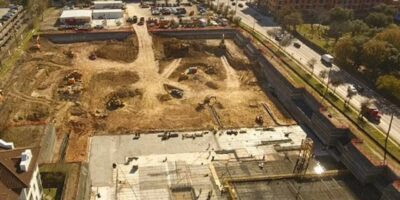
Video:
https://www.youtube.com/watch?v=nbQC7xcWLJE
https://the.ismaili/usa/ismaili-center- ... nuary-2022

Video:
https://www.youtube.com/watch?v=nbQC7xcWLJE
https://the.ismaili/usa/ismaili-center- ... nuary-2022
Ismaili Center Houston: Address by Prince Amyn
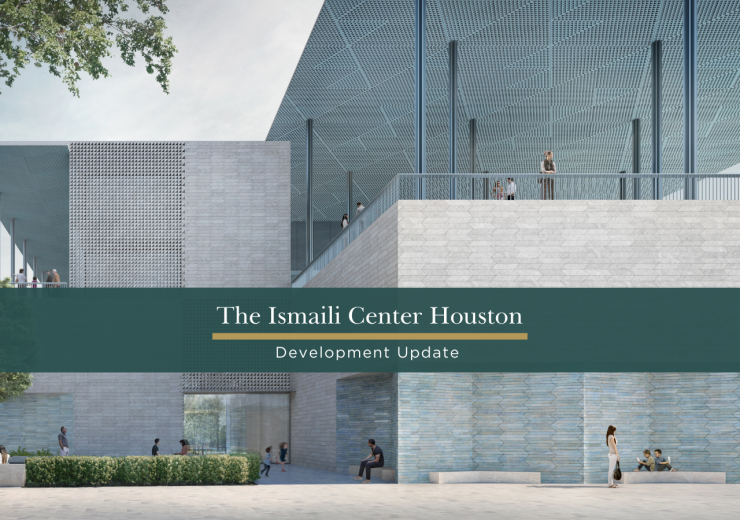
Join us for a live presentation from Houston, USA, on Thursday 11 August, featuring reflections on the upcoming Ismaili Center from Prince Amyn and Mayor of the City of Houston Sylvester Turner.
Mawlana Hazar Imam announced the establishment of the Ismaili Center during his Diamond Jubilee visit to the United States. In November 2021, a design preview event was held in Houston to reveal the plans to an audience of civil society leaders and guests.
The upcoming event will offer an opportunity to share progress on the project thus far, including an architectural fly-through of the planned building and its gardens.
The Center in Houston will join its counterparts in Dubai, Dushanbe, Lisbon, London, Toronto, and Vancouver.
Ismaili Centers have been developed to respond to the Jamat’s presence and its expanding engagement with civil society. They represent its aspirations, serve as its institutional, intellectual, and cultural hubs, and function as a place of contemplation and gathering. A congregational space for the traditions and religious practices of the Ismaili community, known as the Jamatkhana, is incorporated within every Ismaili Center.
Comprising spaces for social and cultural gatherings, intellectual engagement and reflection, and spiritual contemplation, the new Center will promote friendship and understanding among faith communities, government, and civil society. It will serve as a venue for all Houstonians to participate in thoughtful programs and meaningful exchanges.
Tune in for the exclusive presentation on Thursday, 11 August 2022 on The Ismaili TV. The event is expected to begin at 12:30 PM (Houston), 6:30 PM (London), and 8:30 PM (Nairobi). Additional timings are available on The Ismaili TV guide.
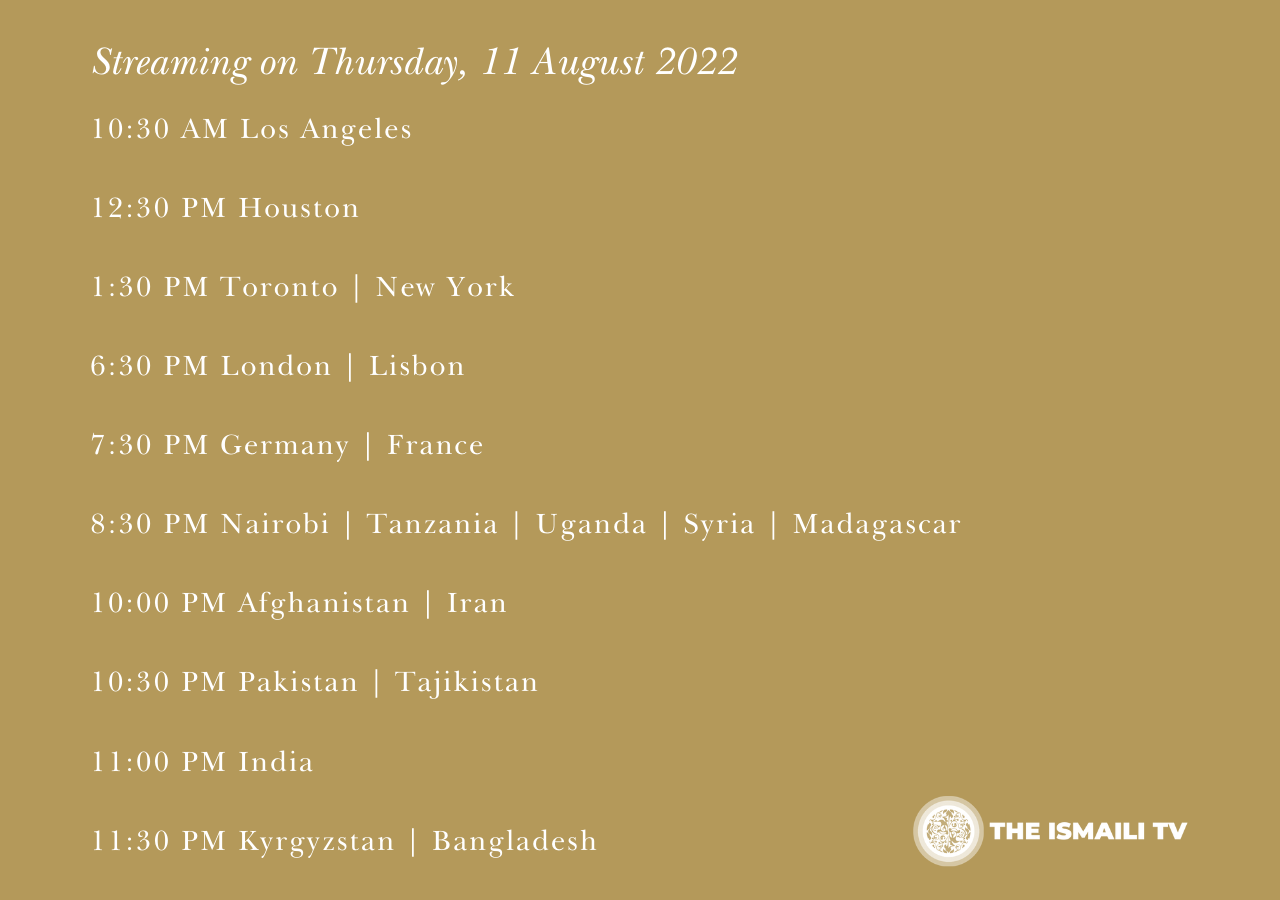
Prince Amyn - ISMAILI CENTRE HOUSTON project
2022, August 9th: Prince Amyn Aga Khan arrived in Houston
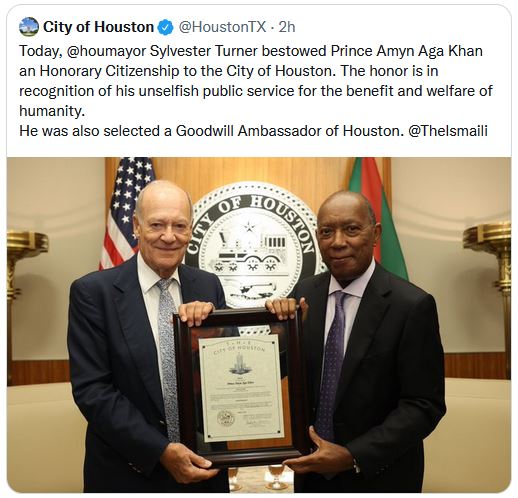
.

.
Re: ISMAILI CENTRE HOUSTON
2022, August 11: Prince Amyn Aga Khan Speech in Houston, Texas today (Ismaili Center)
VIDEO SPEECH:
https://ismaili.net/timeline/2022/2022- ... e-Amyn.mp4
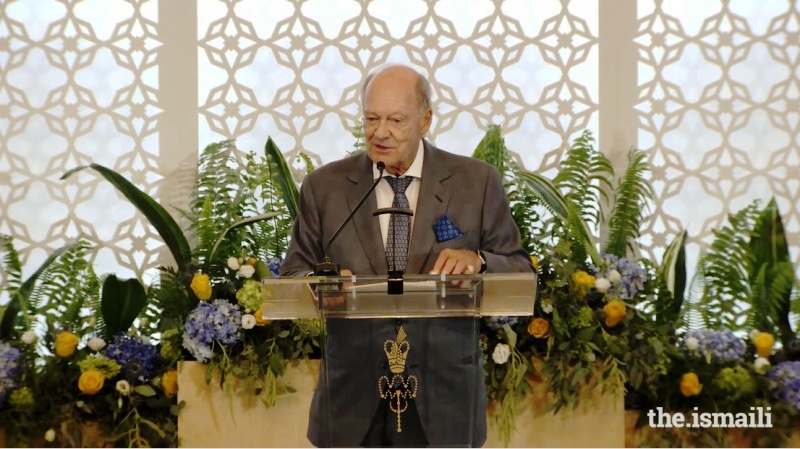
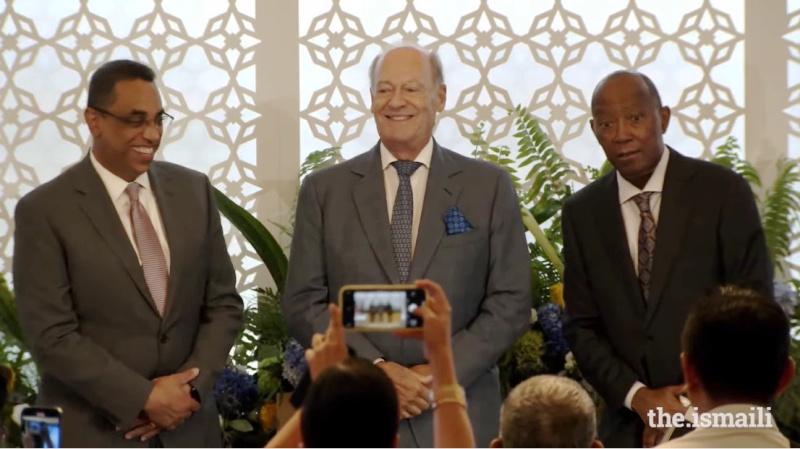
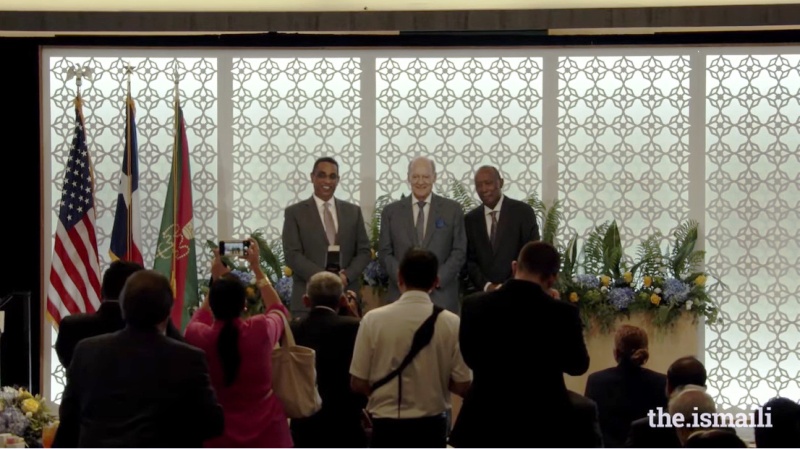
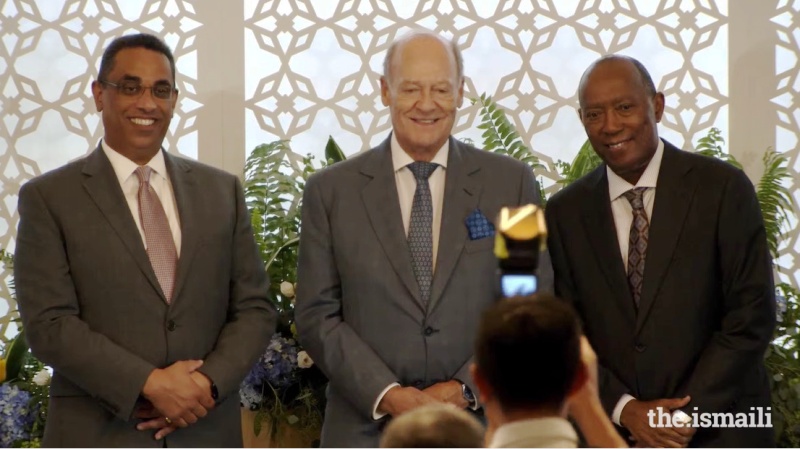
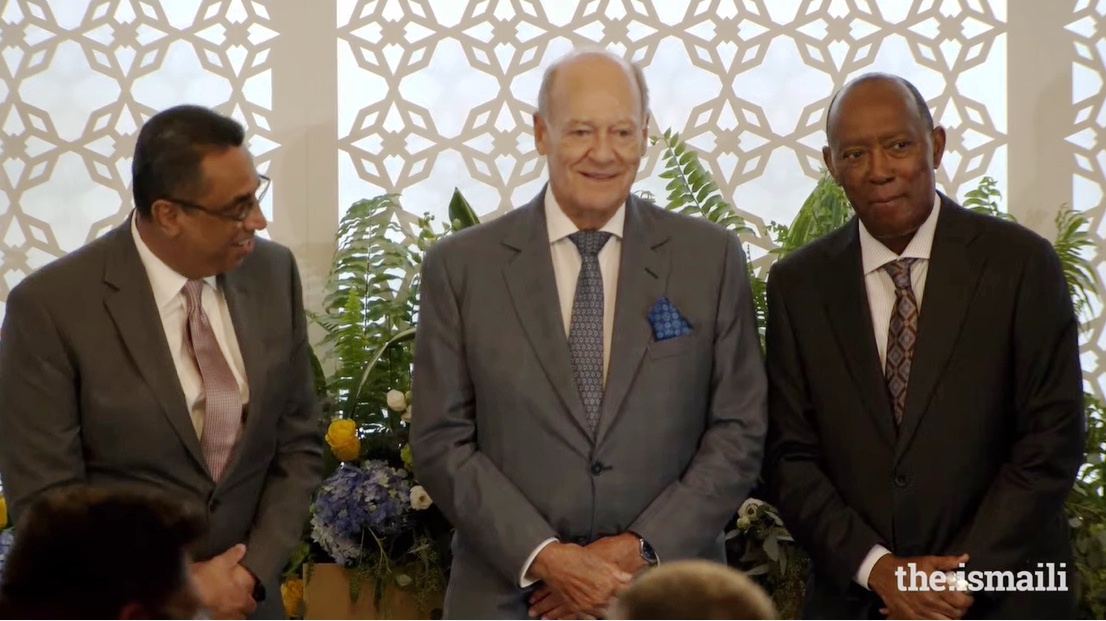
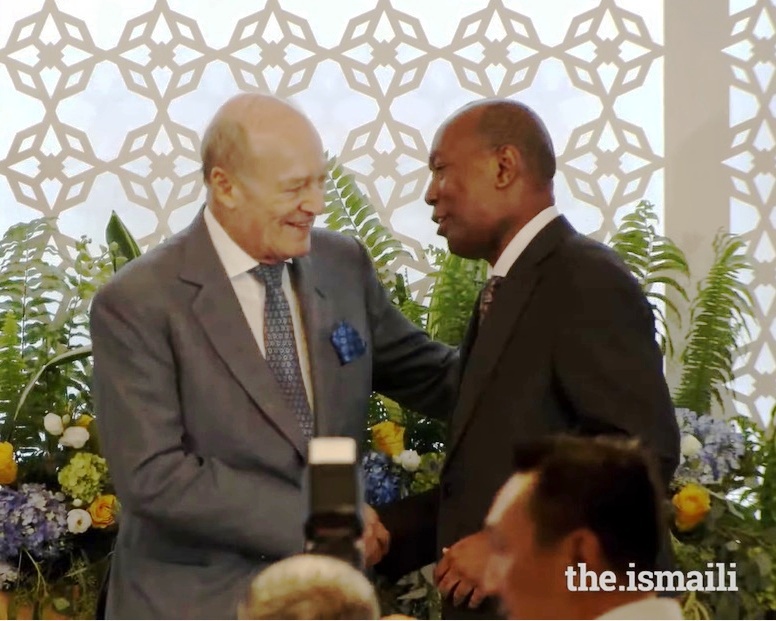
VIDEO SPEECH:
https://ismaili.net/timeline/2022/2022- ... e-Amyn.mp4






Prince Amyn and Mayor Turner share their aspirations for the Ismaili Center Houston
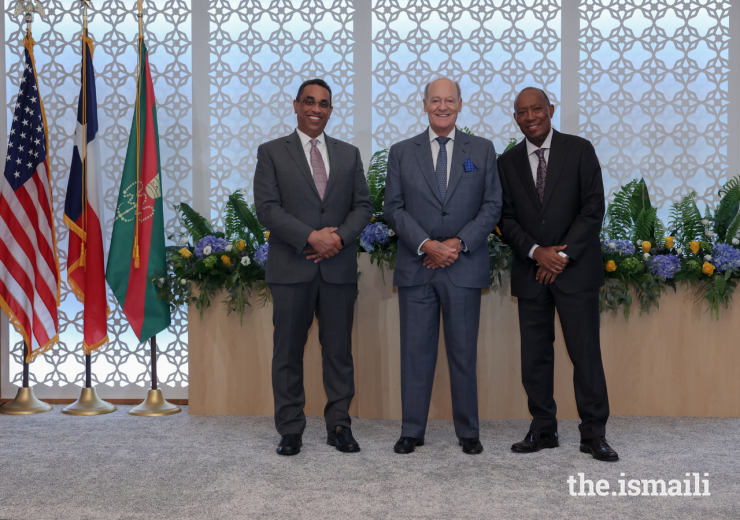
As anticipation for the upcoming Ismaili Center in Houston continues to build, Prince Amyn joined Honorable Mayor of Houston Sylvester Turner earlier today to engage in a dialogue around what the Center will represent.
President Al-Karim Alidina of the Ismaili Council for the USA welcomed guests to the luncheon hosted in downtown Houston, and expressed the Jamat’s gratitude to Mawlana Hazar Imam for establishing the first high-profile Center in the United States.
Soon after, guests were treated to an architectural flythrough video that offered a glimpse of what the newest Center and its gardens will look and feel like. The preview situated the Center among its surroundings and illustrated the scale of the venture.
“The Ismaili Center is an ambitious project not just for the Ismaili Muslim community, but for all Houstonians,” said Prince Amyn in his remarks. “What we are building on the site across the Buffalo Bayou is a Center dedicated to advancing pluralism, public understanding, and civic outreach.”
Advancing Pluralism
Today, Centers exist in London, Vancouver, Lisbon, Dubai, Dushanbe, and Toronto. These Centers have sought to create environments that encourage mutual understanding and facilitate the sharing of perspectives across peoples of diverse faiths, traditions, and origins.
“The Center is intended to be a resource for all Houstonians,” added Prince Amyn, “as a place to come together with local, national, and international partners — many of whom are here today — to enhance the vibrant nature and rich cultural tapestry of this city.”
Houston was recently declared the most diverse city in the United States. As the fourth most populous city in the country, it also boasts a fast-growing artistic and cultural scene. The Center will enable the Jamat to play a greater part in this growth.
“I have always believed that art and culture are effective ways to connect communities, and one of the Center’s objectives will be to offer the highest caliber of cultural programming and promote cultural dialogue, which are all key elements of enhancing one’s quality of life,” said Prince Amyn.
“The dialogue between cultures has forever existed as a result of man’s urge and need to travel, to discover, to meet people, to share experiences, to buy and to sell. Cultural dialogue unites by showing, by underlining what we share despite our apparent differences.”
Public Understanding
Ismaili Centers are symbolic markers of the permanent presence of the community in the regions in which they are established. Architecturally unique, each building incorporates spaces for social and cultural gatherings, intellectual engagement and reflection, as well as spiritual contemplation.
Like its counterparts around the world, the new addition in Houston will be a representational building for Ismaili Muslims, and a place for dialogue, learning, and bridge-building across all communities. It will also seek to promote greater understanding about Islam, Muslims, and their history and civilizations, as well as of the Ismaili community, by highlighting shared values and experiences.
This aspiration is well-represented in the architecture of the building itself, which will combine contemporary technology with traditional Persian forms and ornament, and include influences drawn from Islamic traditions around the world.
“The Ismaili Center Houston will be a magnificent building,” said Mayor of Houston Sylvester Turner, “both physically – with its landmark architecture, picturesque gardens, and ingenious design – and societally speaking, through its impact on Houston, across Texas, and throughout the United States.”
“The Center will be a place where Houston’s communities come together to strengthen and forge new bonds, and work together based on our common values towards a future that shines even brighter than the present,” added Mayor Turner.
While being a place of contemplation and prayer, it will also host public programs that foster dialogue, explore new ideas, celebrate knowledge, and encourage civic activity.
Civic Outreach
In Houston specifically, the Mayor takes pride in the close ties our community has with the city. He particularly commended the Jamat for its ability to serve others, especially in times of turmoil.
“I do want to underscore the importance of the Ismaili community to the city of Houston,” said Mayor Turner in an exclusive interview with The Ismaili TV. “On every single occasion when we needed people to step up and be volunteers, the Ismaili community has been one of the first groups to raise their hand and say ‘Mayor, you can count on us.’ So for that, we are extremely proud and grateful.”
The Jamat in the region has on many occasions, both during and before the Covid-19 pandemic, organized food distribution, blood drives, and awareness seminars for their neighboring communities, and has become recognised as a major contributor to broader society in the city and beyond.
In the diverse city of Houston, this spirit of volunteerism has helped to bring people together around shared values. Through the permanence of the upcoming Center, the Ismaili community and its neighbors in the United States can anticipate many more generations of warm and friendly coexistence.
“We want to be diverse, but we want to be inclusive at the same time, and we want to celebrate that diversity of culture that exists,” added Mayor Turner before departing. “And you do that, in large part, by establishing venues that attract and appeal to the multiculturalism that exists within our city. And that’s why the Ismaili Center Houston is so, so important.”
More photos at:
https://the.ismaili/global/news/imamat- ... -173435533
Houston's Ismaili community to build inclusive center in downtown
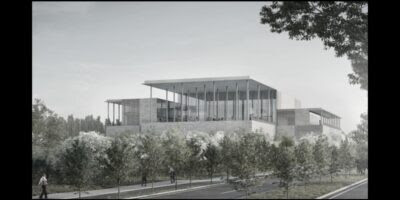
A community building is currently under construction in downtown Houston, and while it's being built by the city's Ismaili Muslim residents, it will be a place where everyone is welcome.
Video:
https://www.youtube.com/watch?v=UddchLwR5ZI
Mawlana Hazar Imam honored with the Key to the City of Houston
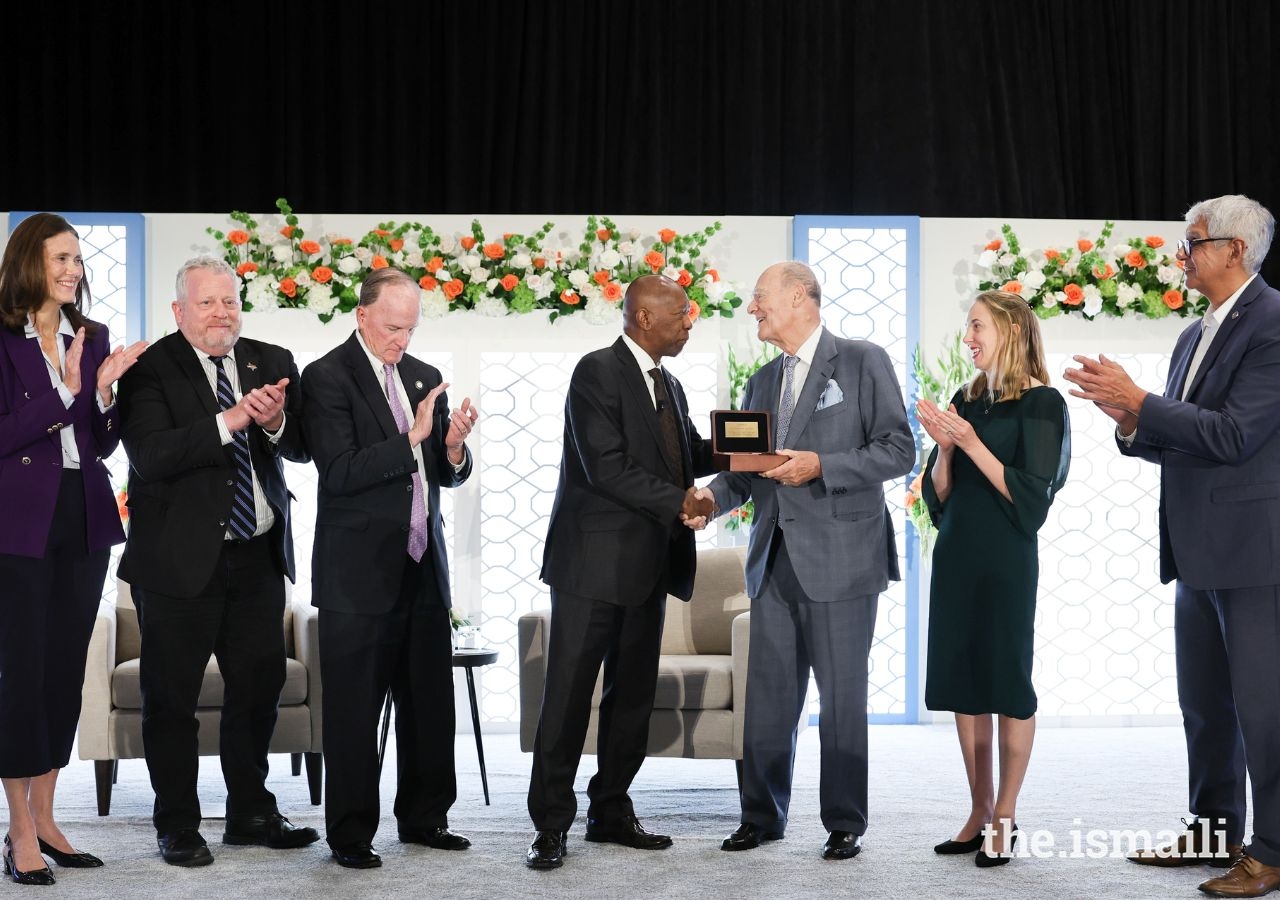
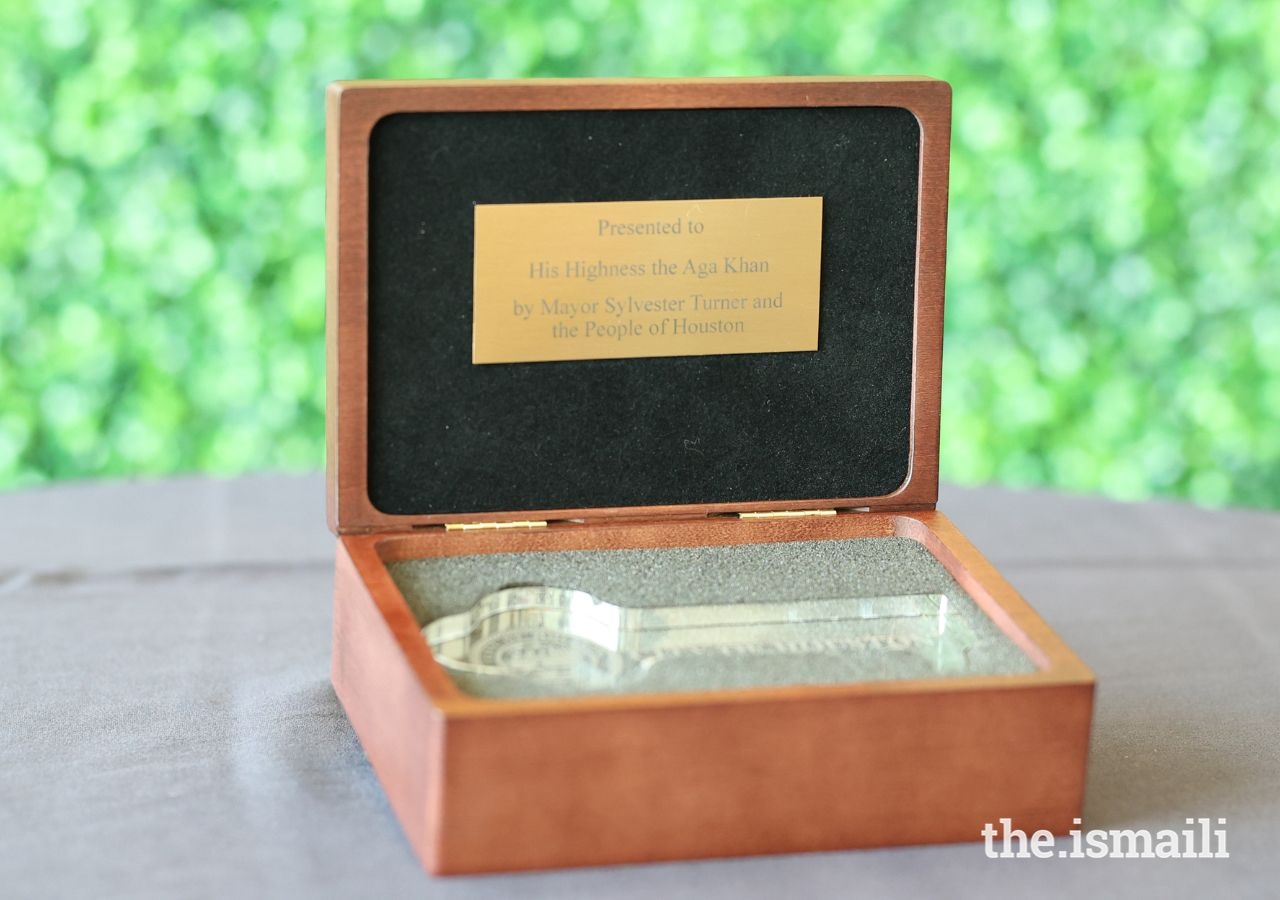
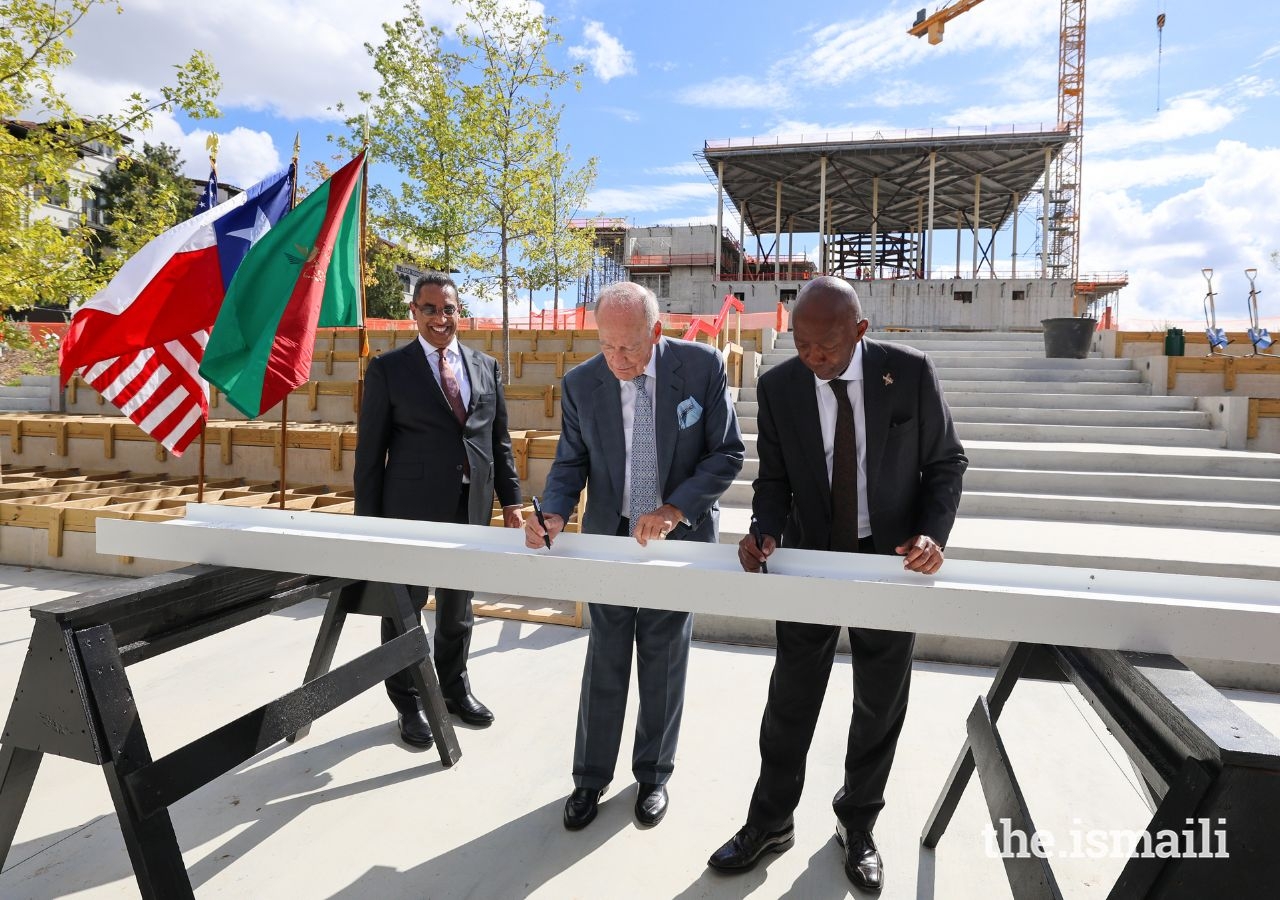
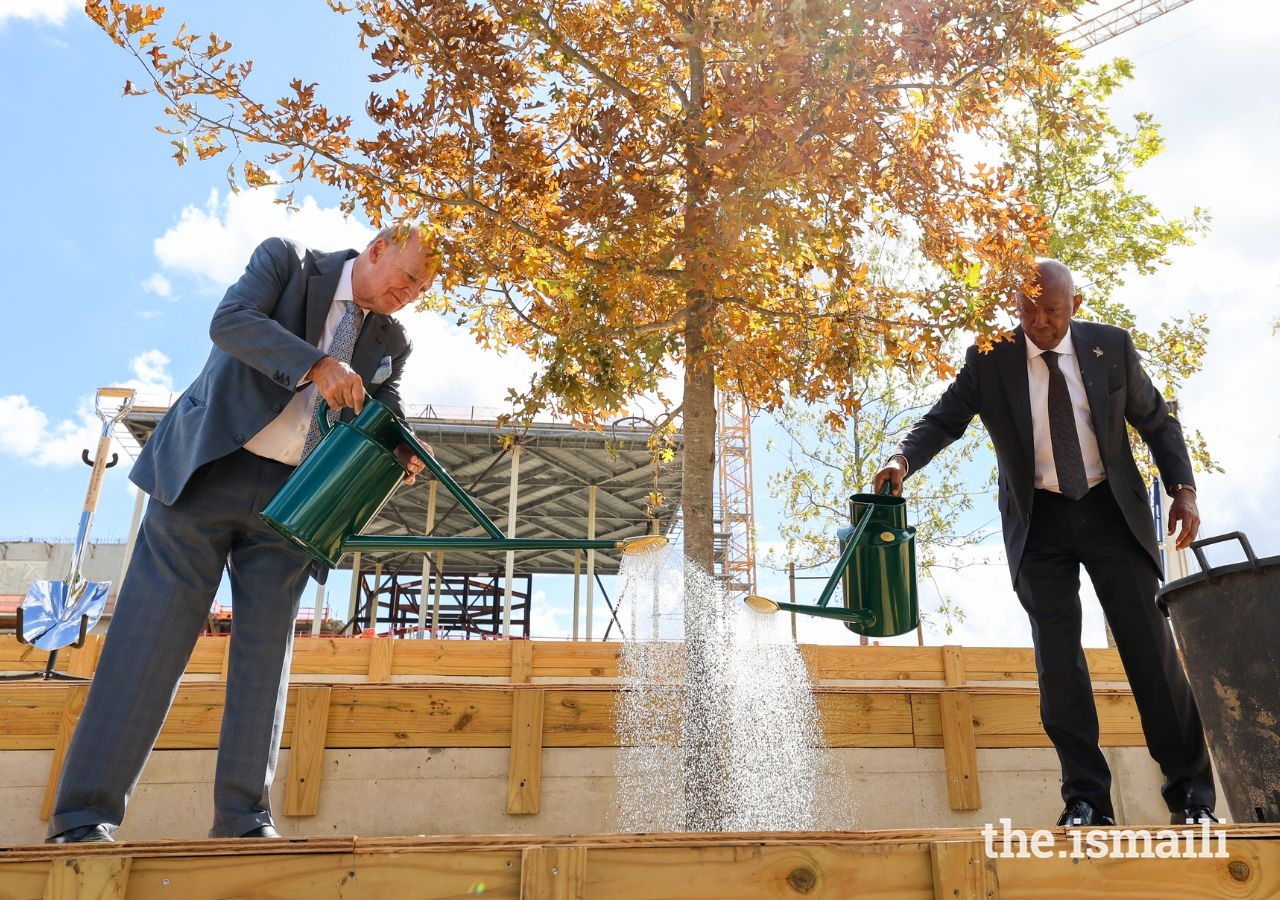
The Ismaili Center Houston achieved a significant milestone today with a special ‘topping out’ ceremony attended by Prince Amyn and Houston Mayor Sylvester Turner.
To acknowledge his support in the planning and construction of the first Ismaili Center in the US, the event included a luncheon in honor of Mayor Turner, at which elected officials, civil society leaders, and friends and partners of the Jamat were present.
In a moment of special recognition, Mayor Turner awarded the key to the city of Houston to Mawlana Hazar Imam, which Prince Amyn accepted on his behalf. The distinguished honor is a symbol of trust and friendship that dates back to medieval times.
“I would like to begin my comments this afternoon by saying how touched I am by the recognition that you have given to my brother, His Highness the Aga Khan. It is with great happiness that I receive, on his behalf, the Key to this wonderful city. He has previously remarked on this old historical tradition that has existed in many countries in many parts of the world and has said quote: ‘I am going to use these keys to open as many doors as possible. Doors to happiness, doors to peace, doors to unity, doors to human progress.’”
Prince Amyn also expressed appreciation for the warm reception in Houston, highlighting the role of the upcoming Ismaili Center as a hub for cultural exchange, intellectual growth, and community engagement. The ‘topping out’ ceremony celebrates the completion of the building’s superstructure and the placement of the final beam, marking a milestone in the construction journey.
The Center’s expansive gardens and public spaces will welcome people from all walks of life, beliefs, and backgrounds to engage in enriching programs and meaningful dialogue.
During the ceremony, President Al-Karim Alidina of the Ismaili Council for the USA spoke of the crucial support provided by Mayor Sylvester Turner and his office, emphasizing the collaborative efforts that have propelled the project forward.
“We are grateful for the Mayor’s support and proud that the Center’s development occurred in large part during his time as Mayor,” he said.
“We are thrilled to honor Mayor Turner as we mark the topping out of the Ismaili Center, and look forward to the Center contributing to Houston’s rich, vibrant, and pluralistic fabric for decades, or perhaps centuries, to come.”
In his remarks, Mayor Turner underscored the importance of promoting sustainability in a rapidly expanding urban environment, praising the Ismaili community's dedication to environmentally responsible construction practices.
In an onstage conversation with award-winning journalist, Linda Lorelle, Mayor Turner spoke of his time as mayor and his engagement with the Jamat.
“As excited as I am about the construction, I am equally excited about the message that it sends and brings. It focuses on tolerance, inclusion, diversity, pluralism, and I can’t think about a better place than right here in the City of Houston,” he said.
To commemorate the occasion, Prince Amyn, Mayor Turner and a small number of guests visited the construction site and signed the final beam that will complete the superstructure of the building. Prince Amyn and Mayor Turner together planted a Texas Red Oak tree, intended to grow and mature alongside the Ismaili Center, symbolizing progress and stability, and offering wishes for peace and prosperity.
https://the.ismaili/global/news/imamat- ... ty-houston?
